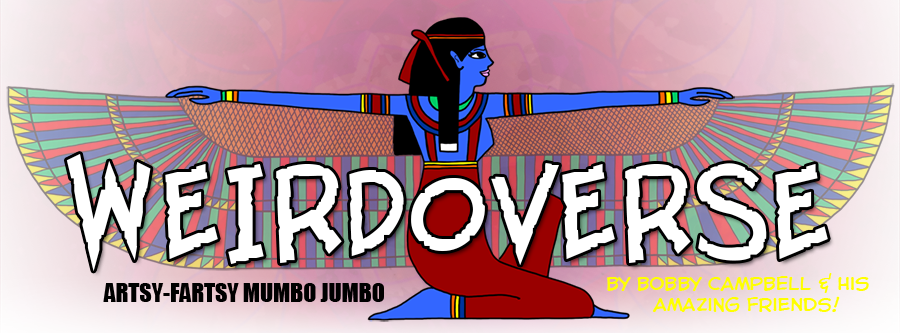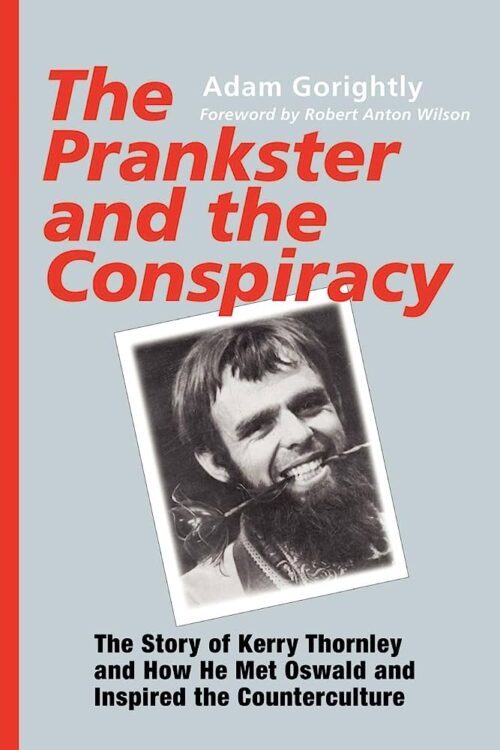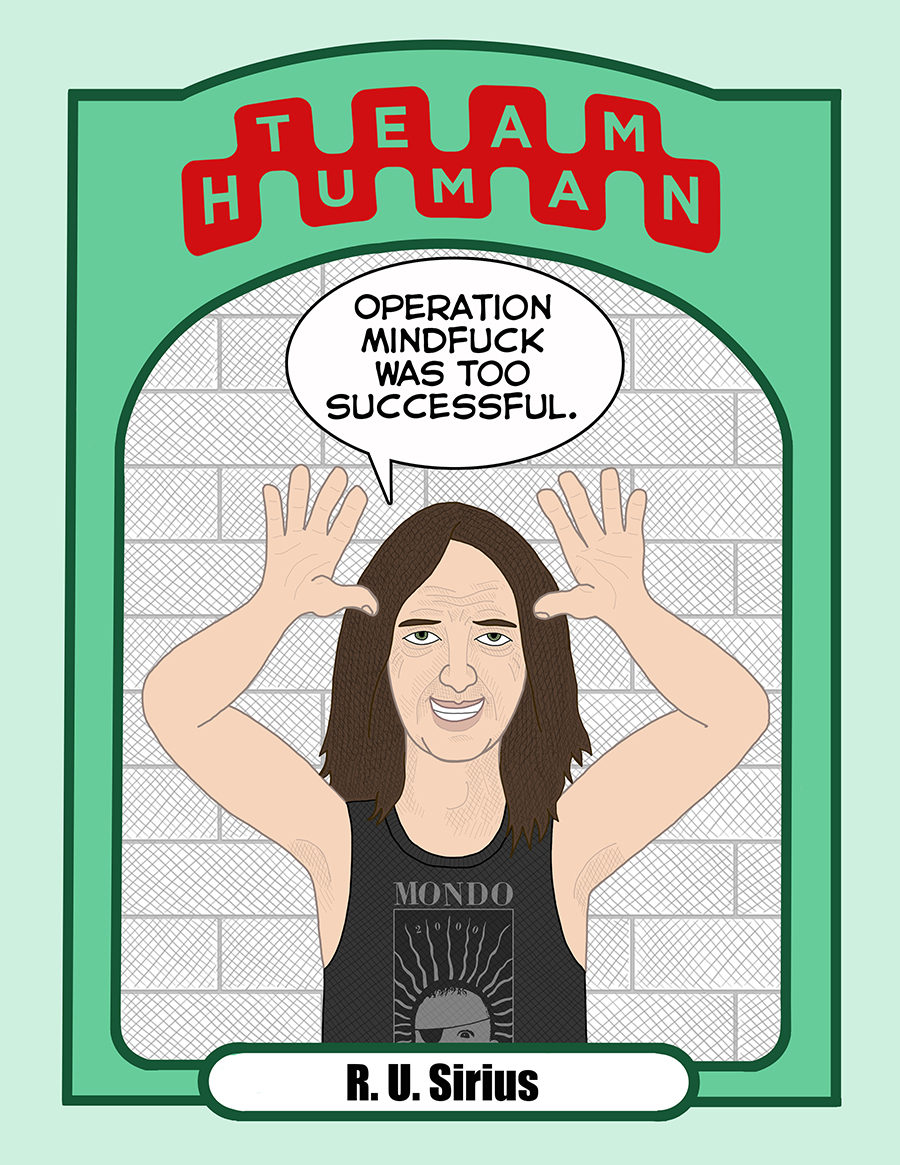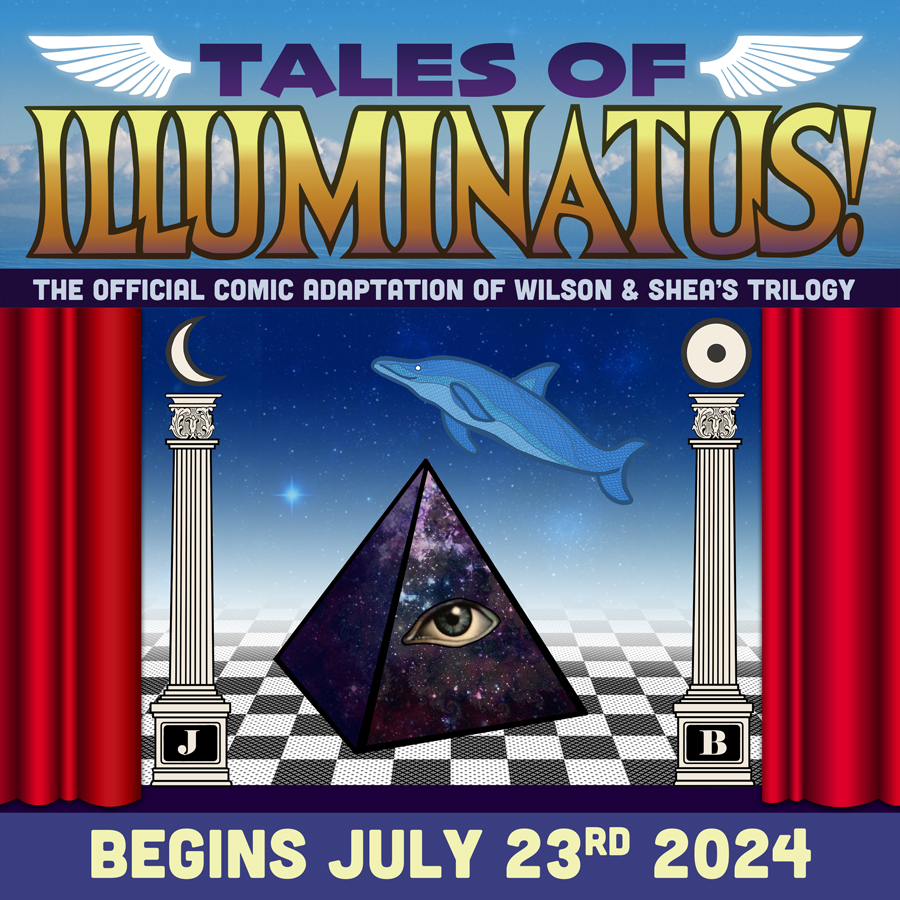
Announcing TALES OF ILLUMINATUS!
The official comic adaptation of Robert Anton Wilson
& Robert Shea‘s Illuminatus! Trilogy.
Web comic serialization begins on July 23rd 2024
AKA MAYBE DAY :)))
Check out Episode 1: “ADAPTATION”
Category Archives: NEW TRAJECTORIES
LIVING IN A RAW WORLD
A SPECIAL MAYBE DAY PRESENTATION :)))
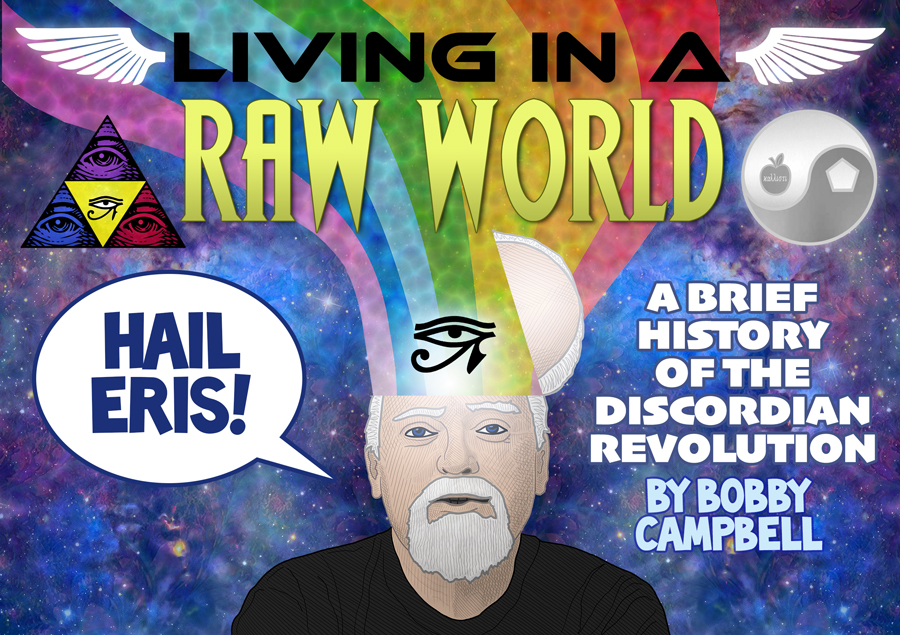
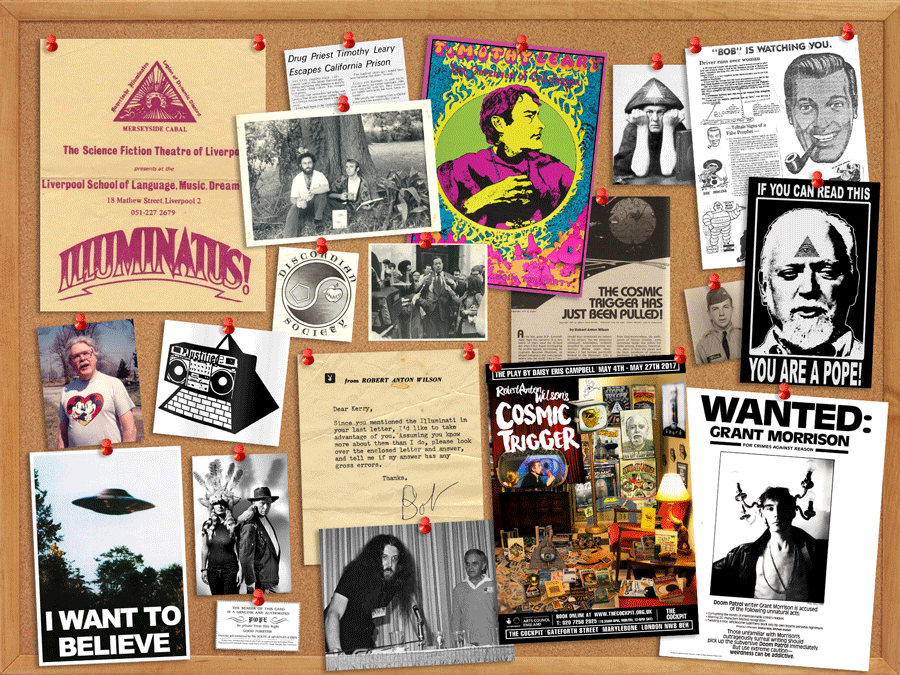
It’s March of 1977 and Robert Anton Wilson is standing bare-ass naked on stage at the Royal National Theatre in London, tripping on acid, participating in a black mass, chanting Aleister Crowley’s axiom “do what thou wilt shall be the whole of the law,” in front of a sold-out crowd, all under the patronage of Her Majesty Queen Elizabeth II. This sensationally surreal scene was part of a critically acclaimed, and now legendary, theatrical adaptation of Wilson’s hit underground novel Illuminatus!, co-authored with Bob Shea.
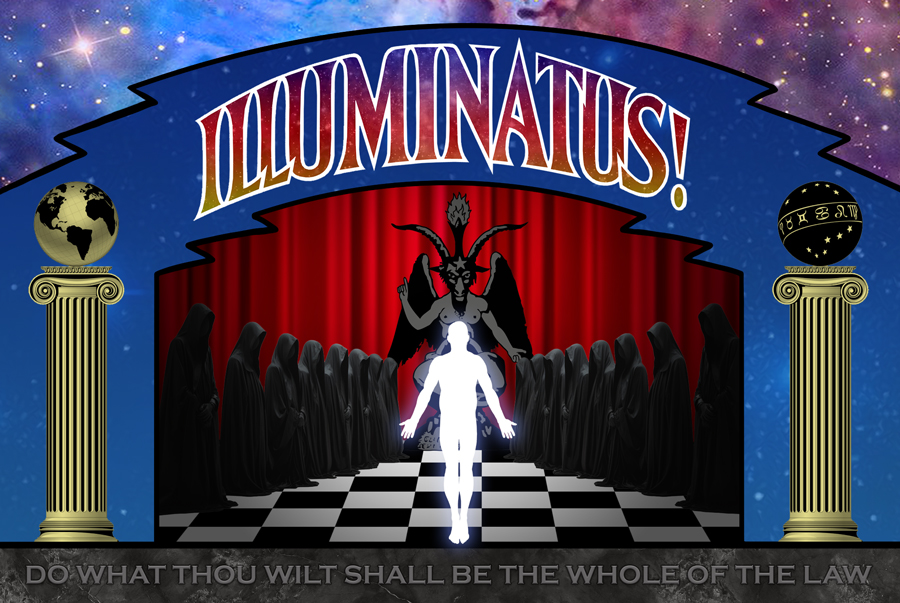
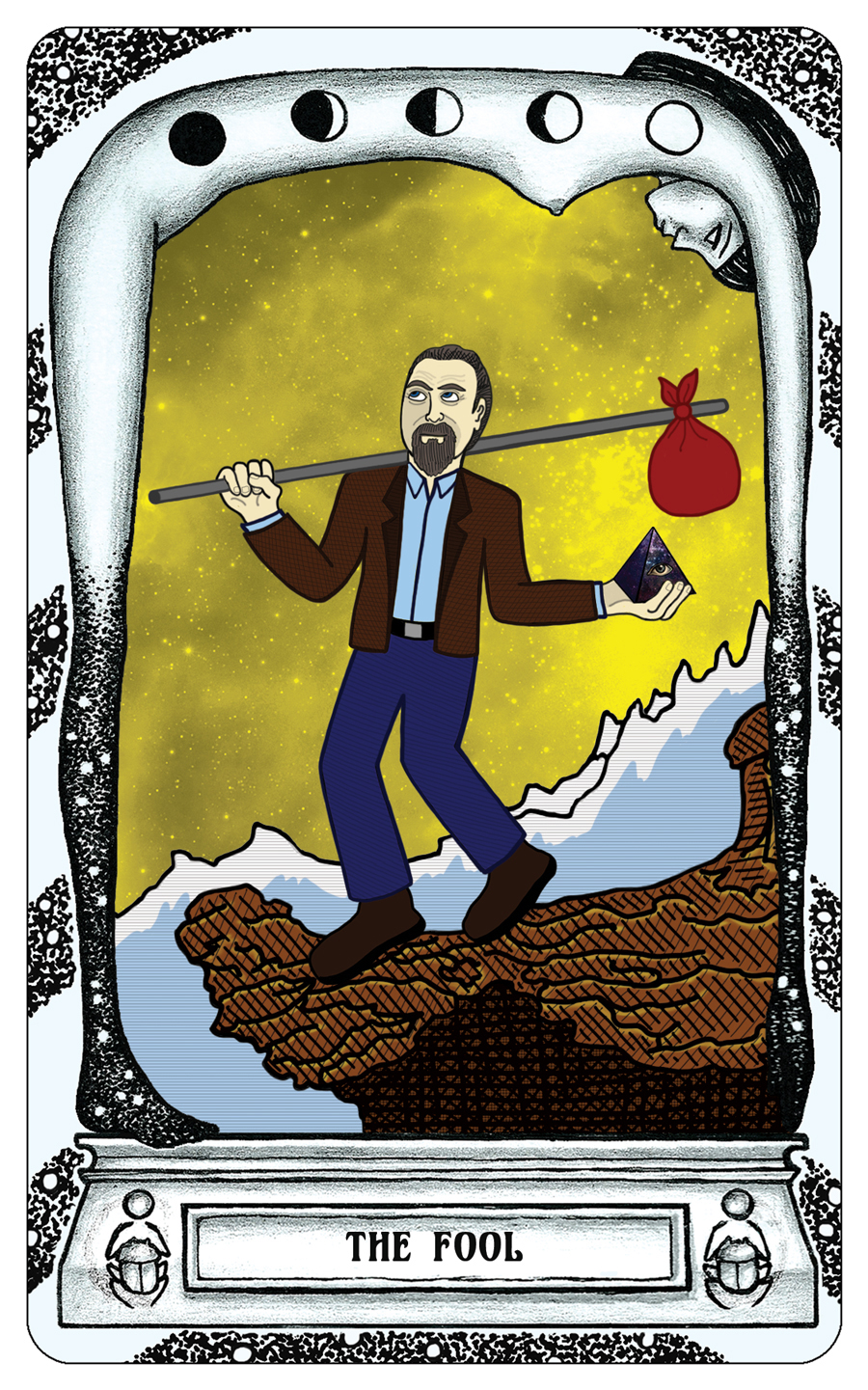 RAW delighted in the absurdity of his little walk-on cameo role, especially since it had been such a long and difficult road to achieve any sort of success with his writing. He’d persisted through two decades of obscurity in the underground press, relative monotony in corporate publishing, long stretches of desperate poverty, and a four year long struggle to get a publisher to take a chance on Illuminatus! Even then it was only after chopping the novel into 3 volumes, and cutting 500 pages entirely, that Wilson & Shea’s epic would finally see print. RAW worried that their masterpiece had been butchered, and that the magic of the book might have been lost in the budget conscious editorial process, but surely those concerns were beginning to subside amidst the grand spectacle of what has been called the most remarkable play ever staged on planet world!
RAW delighted in the absurdity of his little walk-on cameo role, especially since it had been such a long and difficult road to achieve any sort of success with his writing. He’d persisted through two decades of obscurity in the underground press, relative monotony in corporate publishing, long stretches of desperate poverty, and a four year long struggle to get a publisher to take a chance on Illuminatus! Even then it was only after chopping the novel into 3 volumes, and cutting 500 pages entirely, that Wilson & Shea’s epic would finally see print. RAW worried that their masterpiece had been butchered, and that the magic of the book might have been lost in the budget conscious editorial process, but surely those concerns were beginning to subside amidst the grand spectacle of what has been called the most remarkable play ever staged on planet world!
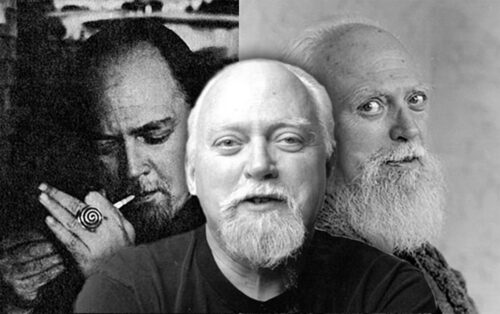 Robert Anton Wilson would go on to have an incredibly prolific writing career, publishing 35 books on a dazzling array of topics, with stunningly precise prescience, and producing a lasting impact on the cultural zeitgeist that, if you know where to look, continues to unfold all around us, for better and worse! He never quite achieved the fame or fortune that an artist of his stature might generally enjoy, and I wouldn’t blame folks for wondering, “if this guy’s so great, why haven’t I heard of him?” But really, I propose, they probably have, in one way or another, in some form or fashion, after all, as I intend to demonstrate, we’re living in his world.
Robert Anton Wilson would go on to have an incredibly prolific writing career, publishing 35 books on a dazzling array of topics, with stunningly precise prescience, and producing a lasting impact on the cultural zeitgeist that, if you know where to look, continues to unfold all around us, for better and worse! He never quite achieved the fame or fortune that an artist of his stature might generally enjoy, and I wouldn’t blame folks for wondering, “if this guy’s so great, why haven’t I heard of him?” But really, I propose, they probably have, in one way or another, in some form or fashion, after all, as I intend to demonstrate, we’re living in his world.
“The ideas of Robert Anton Wilson are, I think, central to the way I am conducting my life at the moment,” Alan Moore remarked as recently as 2016, but that’s getting ahead of ourselves, currently we’re still back in 1977, with a naked Mr. Wilson, wondering about the occult implications of his creation.

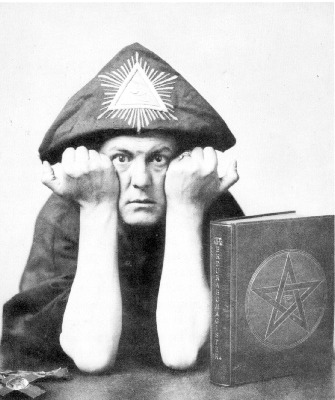 Aleister Crowley defined magick as the science and art of causing change to occur in conformity with the will. Crowley was adamant that his ideas should persist into the future, and as RAW stood on that grand stage, a very literal extension of that persistence, he wondered how much of this was by his own design, and how much had been programmed by Crowley long before he was even born.
Aleister Crowley defined magick as the science and art of causing change to occur in conformity with the will. Crowley was adamant that his ideas should persist into the future, and as RAW stood on that grand stage, a very literal extension of that persistence, he wondered how much of this was by his own design, and how much had been programmed by Crowley long before he was even born.
There’s an exercise that I picked up from RAW, who picked it up from Crowley, who picked it up from a Buddhist monk in Ceylon. The exercise simply asks you to try to answer the question: “Why are you doing this exercise?”
Should you endeavor to answer this question, in as much detail as humanly possible, it is said to provide a simulation of enlightenment.
For example, RAW answered that he was doing the exercise because he read about it in a book by Aleister Crowley, and he read a book by Aleister Crowley because his friend and mentor Alan Watts had turned him on to Crowley, and so forth and so on, all the way back to the Scandinavians overfishing the North Sea in the 5th century, which forced his ancestors into piracy, and then even further back to the cosmology of our solar system allowing for a planet capable of sustaining life, etc, et al.
The exercise is meant to help you internalize the vast web of inexplicable coincidences, impossible odds, and infinite possibilities that collapse down to the specific causality of you, for instance, reading an esoteric essay on the internet. “Thermodynamic miracles,” as Dr. Manhattan calls them in Alan Moore and Dave Gibbons’ Watchmen graphic novel.
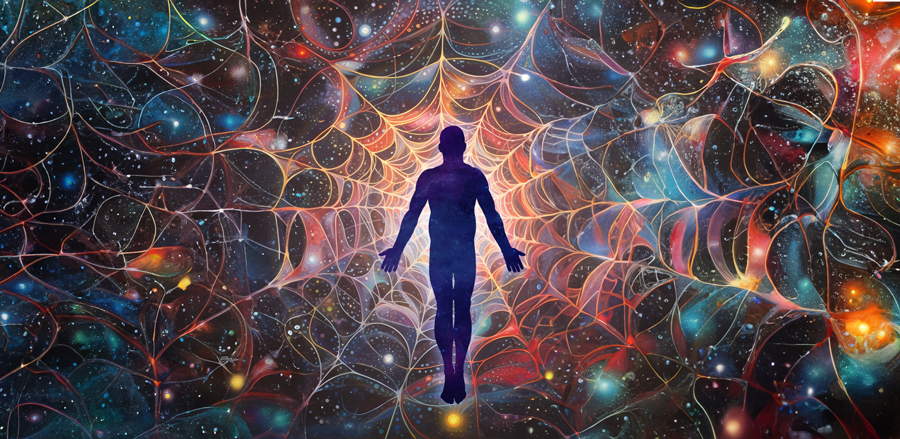
It’s 1963 in Yellow Springs, Ohio, and Jano Watts, Alan Watts’ wife, is explaining to RAW a concept she calls “The Net,” an invisible lattice of synchronicity that connects everything in the universe with everything else in the universe. Now before we begin our exploration of this most bizarre concept in earnest, as an illustrative example of how these things tend to work, earlier today I came across the news that Bill Nighy was nominated for an academy award for the 2022 film Living. The only reason I even know the name Bill Nighy is because just last night, as I was researching some details for this very article, I made note of an anecdote where a Bill Nighy, who starred in the Illuminatus! play as Joe Malik, shared that Robert Anton Wilson had distributed acid to the cast before their 9 hour performance on that aforementioned night in 1977, which is why I know RAW was tripping as he stood there naked and chanting “do what thou wilt shall be the whole of the law.”

“I beg your tolerance. There is nothing I can do
to make things any easier for any of us…”– Illuminatus!, Wilson & Shea.
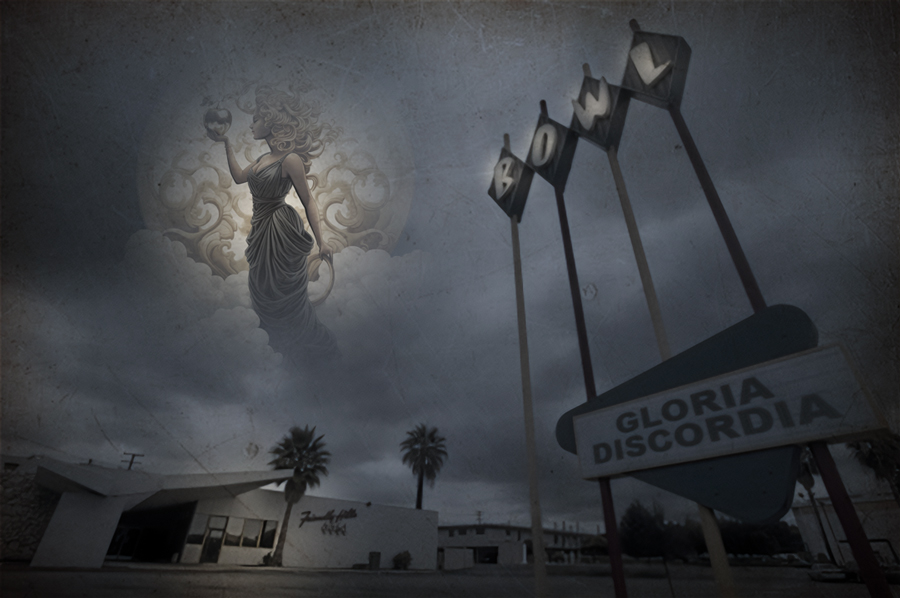
Let’s take a little detour back to a simpler time and place, like maybe The Friendly Hills Lanes bowling alley in Whittier, California, perhaps in 1957, where we might find high school friends Kerry Thornley and Greg Hill debating about the fundamental nature of reality. One particular evening, Hill would successfully convince Thornley that disorder is the primary state of being, and that all existing religions and philosophies merely superimpose artificial constructs of order atop the true and real primordial chaos. So far as they could tell, only the ancient Greeks had even attempted to reckon with this difficult truth by including Eris, the Goddess of Chaos, amongst their pantheon. They decided to build a satirical religion around the celebration of Eris, also known as Discordia, and so began what would become known as the Discordian Society. After Thornley’s brief enlistment in the Marines, the pair would reconvene in New Orleans, in 1961, where their elaborate joke disguised as a new religion, or their new religion disguised as an elaborate joke, would begin to flourish.
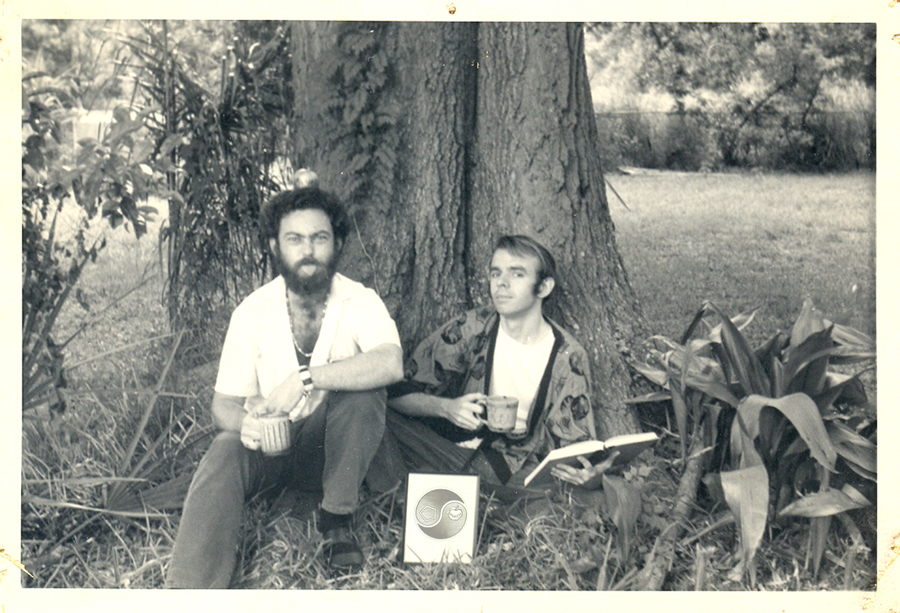
Greg Hill and Kerry Thornley
In later years both Hill and Thornley would question the wisdom of building a belief system around worshiping the goddess of chaos, even in jest, as Thornley put it, “if I had realized that all of this was going to come true, I’d have chosen Venus.”
Robert Anton Wilson would meet Kerry Thornley through the underground press in 1967, the two would become fast friends, and RAW would almost instantly convert to Discordianism. Thornley and Wilson bonded over their shared opposition to violence, authoritarian power structures, and dystopian fatalism. 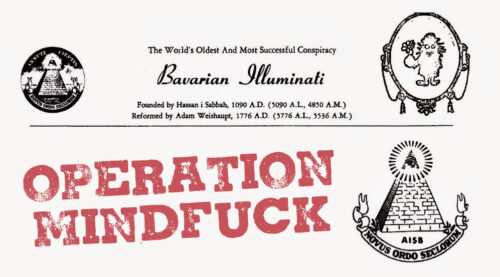 Together they would launch an Erisian movement called Operation Mindfuck, an exercise in guerrilla ontology that would use practical jokes and hoaxes to parody the paranoia that permeated the culture of the late ‘60s. The purpose of Operation Mindfuck, and Discordianism in general, was to escalate confusion and uncertainty to such surreal heights that the pure bewildering uncertainty would shatter the rigid beliefs and oppressive delusions of authoritarian conditioning, creating the conditions for an anarchistic zen enlightenment. An early dictate of OM was to implicate an obscure 18th century secret society called the Bavarian Illuminati in “all national calamities, assassinations, or conspiracies.” A self-evidently absurd proposition that no one could possibly take seriously, they thought, but would quickly grow out of their control, taking on a life of its own that still continues even 50 years later.
Together they would launch an Erisian movement called Operation Mindfuck, an exercise in guerrilla ontology that would use practical jokes and hoaxes to parody the paranoia that permeated the culture of the late ‘60s. The purpose of Operation Mindfuck, and Discordianism in general, was to escalate confusion and uncertainty to such surreal heights that the pure bewildering uncertainty would shatter the rigid beliefs and oppressive delusions of authoritarian conditioning, creating the conditions for an anarchistic zen enlightenment. An early dictate of OM was to implicate an obscure 18th century secret society called the Bavarian Illuminati in “all national calamities, assassinations, or conspiracies.” A self-evidently absurd proposition that no one could possibly take seriously, they thought, but would quickly grow out of their control, taking on a life of its own that still continues even 50 years later.
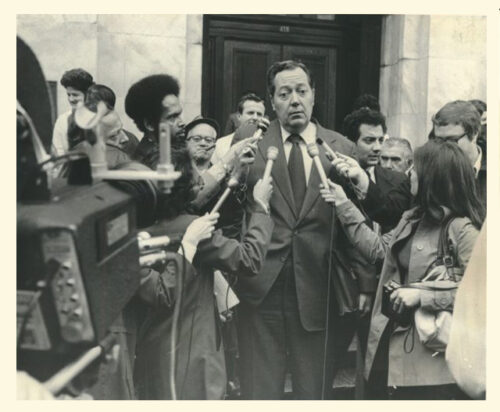 To help understand the origins of the Illuminati conspiracy theory we’re going to need the assistance of New Orleans District Attorney Jim Garrison, who in 1966, launched a new investigation into the assassination of President John F. Kennedy. Garrison, like many Americans, was never quite satisfied with the Warren Commission’s conclusion that Lee Harvey Oswald was solely responsible for JFK’s assassination, and so when he began receiving tips that the plot to murder the president had been hatched in New Orleans, within his jurisdiction, he launched an official investigation. Garrison, who was famously immortalized by Kevin Costner in Oliver Stone’s JFK, and is forever etched into our cultural memory with his repeated line, “back and to the left,” thought that the conspiracy he was investigating was far too large and sophisticated to be discovered with simple facts and logic. Instead Garrison encouraged his investigators to make use of “time and propinquity,” he believed that they could discover the hidden truth by searching for patterns and strange coincidences. This methodology would ultimately put him on a collision course with Kerry Thornley and the explosion of Operation Mindfuck.
To help understand the origins of the Illuminati conspiracy theory we’re going to need the assistance of New Orleans District Attorney Jim Garrison, who in 1966, launched a new investigation into the assassination of President John F. Kennedy. Garrison, like many Americans, was never quite satisfied with the Warren Commission’s conclusion that Lee Harvey Oswald was solely responsible for JFK’s assassination, and so when he began receiving tips that the plot to murder the president had been hatched in New Orleans, within his jurisdiction, he launched an official investigation. Garrison, who was famously immortalized by Kevin Costner in Oliver Stone’s JFK, and is forever etched into our cultural memory with his repeated line, “back and to the left,” thought that the conspiracy he was investigating was far too large and sophisticated to be discovered with simple facts and logic. Instead Garrison encouraged his investigators to make use of “time and propinquity,” he believed that they could discover the hidden truth by searching for patterns and strange coincidences. This methodology would ultimately put him on a collision course with Kerry Thornley and the explosion of Operation Mindfuck.
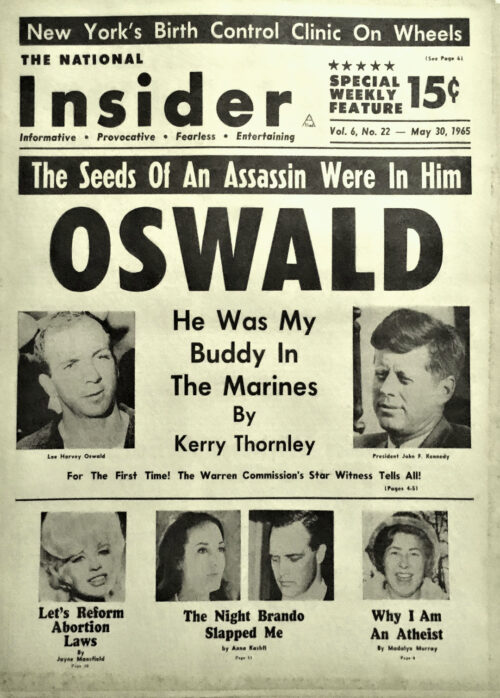 See what had happened was way back when Kerry Thornley joined the Marines, after high school, he was stationed with Lee Harvey Oswald. In fact, the two became closely acquainted, commiserating over their shared disillusionment. Oswald even lent Thornley his copy of Orwell’s 1984. It wasn’t long before Oswald was dishonorably discharged and defected to Russia. Thornley was inspired by Oswald’s defiant individualism, and in 1959, began writing a novel based on him called The Idle Warriors. Imagine Thornley’s surprise on November 22, 1963, when news broke of JFK’s assassination, “it was like the hero of my novel jumped up off the pages of my book and shot the president.” But wait, it gets worse!
See what had happened was way back when Kerry Thornley joined the Marines, after high school, he was stationed with Lee Harvey Oswald. In fact, the two became closely acquainted, commiserating over their shared disillusionment. Oswald even lent Thornley his copy of Orwell’s 1984. It wasn’t long before Oswald was dishonorably discharged and defected to Russia. Thornley was inspired by Oswald’s defiant individualism, and in 1959, began writing a novel based on him called The Idle Warriors. Imagine Thornley’s surprise on November 22, 1963, when news broke of JFK’s assassination, “it was like the hero of my novel jumped up off the pages of my book and shot the president.” But wait, it gets worse!
In June of 1962, Lee Harvey Oswald had moved back to the United States from Russia, and ended up, of course, in New Orleans, living only 2 blocks away from Kerry Thornley. Thornley claims he never saw Oswald again after their time in the Marines, but Garrison had witnesses that placed the two together, along with them having mutual associates who were suspected co-conspirators. Thornley, influenced by Objectivism and other extreme political ideologies of the day, had publicly celebrated JFK’s assassination back in 1963, as a blow against authoritarianism. What else was the propinquity minded prosecutor supposed to think except that, obviously, Kerry Thornley was involved in the conspiracy to assassinate President Kennedy.
Jim Garrison believed he was investigating “a conspiracy so vast as to stagger the imagination,” and Kerry Thornley was at a loss to explain the series of coincidences that had entangled him with this mess, but knowing that he wasn’t actually involved, grew quite antagonistic towards Garrison’s assertions to the contrary. Garrison went as far as to charge Thornley with perjury for denying that he’d been in contact with Oswald in New Orleans. When Thornley discovered that one of Garrison’s investigators, Allan Chapman, believed that the Bavarian Illuminati were behind the JFK assassination, he saw an opportunity for revenge.
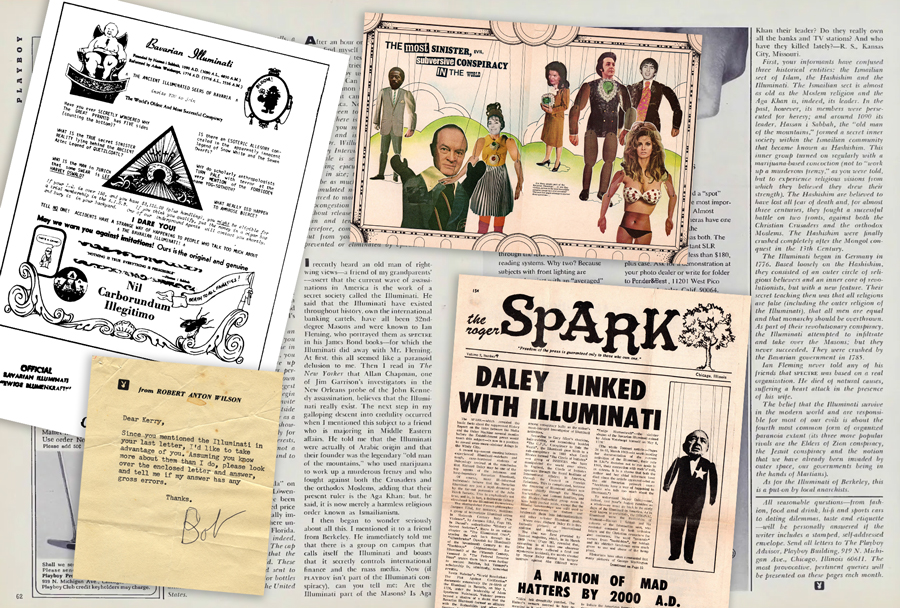
Operation Mindfuck’s initial target was, naturally, Jim Garrison. Thornley, Wilson, and their Discordian collaborators began to flood the underground press with wild stories about the Illuminati, essentially poking fun at the Garrison investigation’s lack of rigor. Wilson and Bob Shea were working as editors at Playboy magazine at the time, overseeing “The Playboy Forum” letters column, and they planted a letter in the April 1969 edition of Playboy that outlined what would become the standard Illuminati conspiracy theory. The intentionally improbable theory that a secret society of eccentric Bavarian philanthropists, founded in 1776, had continued to grow in power and influence, and now controlled the modern world, spread like wildfire.
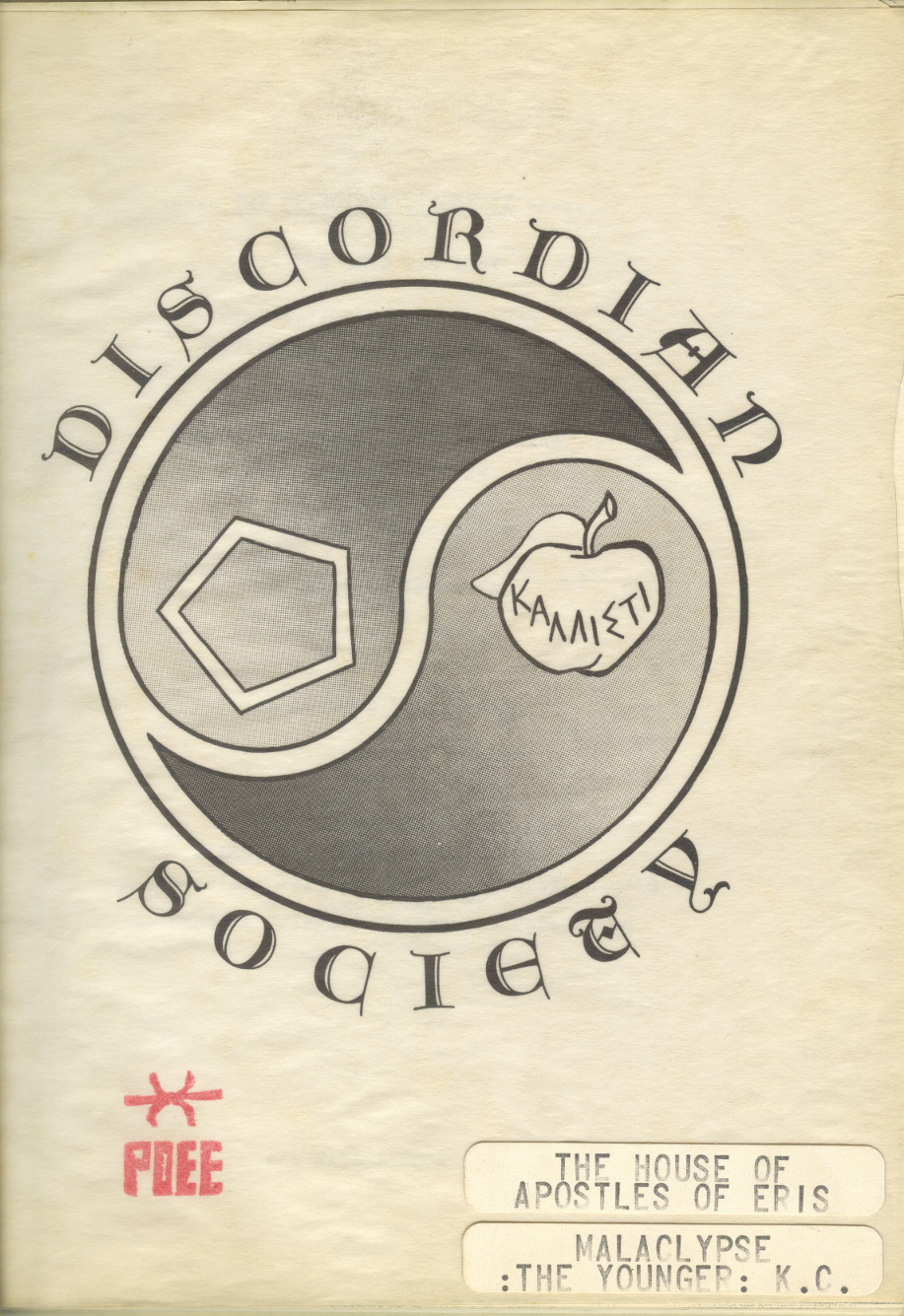 Naturally, due to their OM efforts, Garrison now suspected that the Discordian Society was actually a CIA front and part of the Kennedy assassination team. We can only wonder what Jim Garrison would think if he knew that back in 1963, his secretary, Lane Caplinger, had secretly used the office photocopier to produce the first edition of what would become the Discordian holy book, the Principia Discordia, on behalf of her boyfriend, Greg Hill. (!?!)
Naturally, due to their OM efforts, Garrison now suspected that the Discordian Society was actually a CIA front and part of the Kennedy assassination team. We can only wonder what Jim Garrison would think if he knew that back in 1963, his secretary, Lane Caplinger, had secretly used the office photocopier to produce the first edition of what would become the Discordian holy book, the Principia Discordia, on behalf of her boyfriend, Greg Hill. (!?!)
The Garrison investigation was ultimately unable to untangle the Gordian knot of chaos and confusion that surrounded the assassination of JFK. It only took the jury one hour of deliberation to unanimously acquit New Orleans businessman Clay Shaw, the only suspected conspirator Garrison was able to successfully bring to trial. This, of course, did nothing to slow the onslaught of conspiracy theories surrounding the assassinations of, not only JFK, but MLK, and RFK too. Wilson & Shea were inundated with paranoid letters, from their Playboy readership, detailing innumerable government conspiracies, with wildly disparate degrees of plausibility. It became impossible to tell the difference between Discordians perpetuating Operation Mindfuck and the general public sharing their actual beliefs.
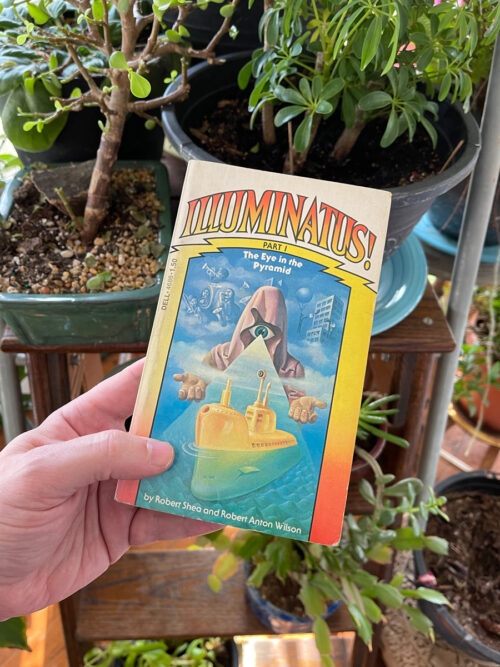 Wilson & Shea decided to take this mass of insane material and play a literary game with it, working with the premise that every conspiracy theory was true, no matter how outlandish or contradictory, and over the next few years constructed the massive Illuminatus! manuscript. They used the Principia Discordia and Operation Mindfuck as their central theme and built a labyrinthine mythology around the Discordian Society and their ancient antagonists, the Illuminati, cleverly utilizing Playboy’s research staff to help them weave their fantastic fictions with well sourced facts, creating a truly spellbinding synthesization of fantasy and reality. Wilson & Shea dedicated Illuminatus! to Thornley and Hill in acknowledgement of their chaotic inspiration.
Wilson & Shea decided to take this mass of insane material and play a literary game with it, working with the premise that every conspiracy theory was true, no matter how outlandish or contradictory, and over the next few years constructed the massive Illuminatus! manuscript. They used the Principia Discordia and Operation Mindfuck as their central theme and built a labyrinthine mythology around the Discordian Society and their ancient antagonists, the Illuminati, cleverly utilizing Playboy’s research staff to help them weave their fantastic fictions with well sourced facts, creating a truly spellbinding synthesization of fantasy and reality. Wilson & Shea dedicated Illuminatus! to Thornley and Hill in acknowledgement of their chaotic inspiration.
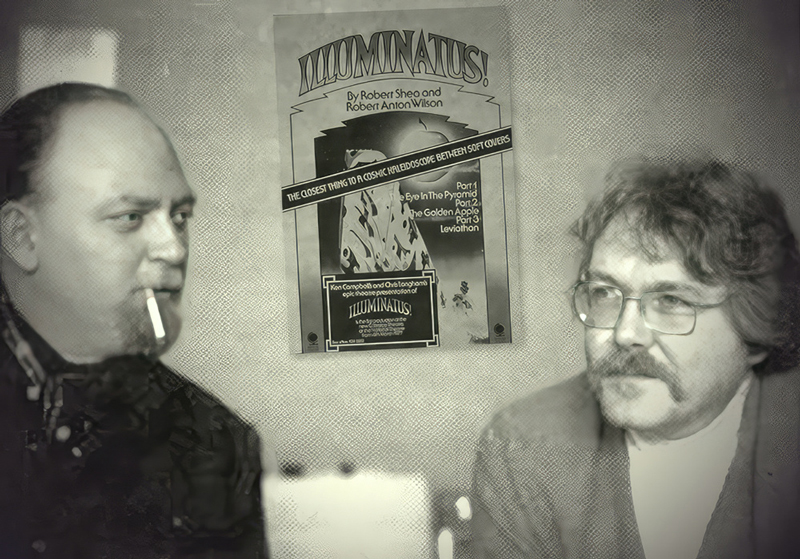
Bob Wilson and Bob Shea at the Illuminatus! play in 1977
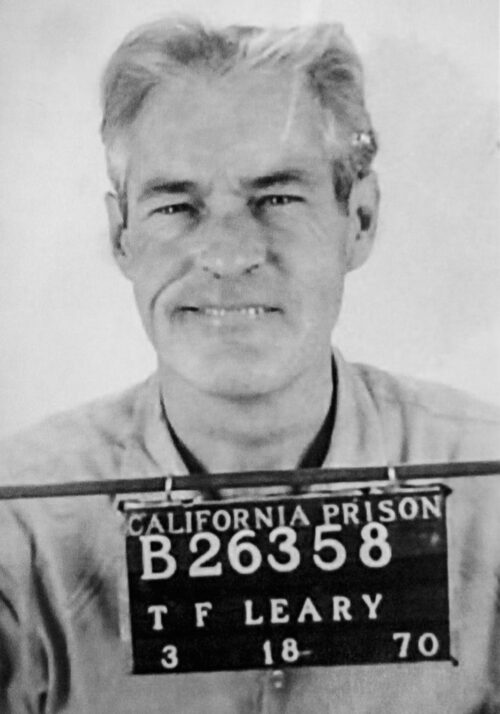 On September 13, 1970, another one of Wilson’s infamous friends, frequent collaborators, and main inspirations for Illuminatus!, Dr. Timothy Leary, made a daring escape from the California Men’s Colony West, a minimum security prison in San Luis Obispo, California. Leary, who before becoming the “High Priest of LSD,” was a well accomplished Harvard psychologist, had been given a psychological evaluation of his own design when he first arrived at the prison. Leary gamed the system to give himself a psych profile that granted him minimal supervision and an outdoor work detail, which allowed him to escape with the help of the Weather Underground, a far-left militant organization. While Wilson & Shea were still penning their psychedelic odyssey, Leary was living the real deal, on the run in Algiers with Eldridge Cleaver and the Black Panthers, before making his escape to Switzerland, in 1971, where he was caught and faced extradition back to the United States.
On September 13, 1970, another one of Wilson’s infamous friends, frequent collaborators, and main inspirations for Illuminatus!, Dr. Timothy Leary, made a daring escape from the California Men’s Colony West, a minimum security prison in San Luis Obispo, California. Leary, who before becoming the “High Priest of LSD,” was a well accomplished Harvard psychologist, had been given a psychological evaluation of his own design when he first arrived at the prison. Leary gamed the system to give himself a psych profile that granted him minimal supervision and an outdoor work detail, which allowed him to escape with the help of the Weather Underground, a far-left militant organization. While Wilson & Shea were still penning their psychedelic odyssey, Leary was living the real deal, on the run in Algiers with Eldridge Cleaver and the Black Panthers, before making his escape to Switzerland, in 1971, where he was caught and faced extradition back to the United States.
Leary was a major target for Richard Nixon’s newly launched War on Drugs, and the Hippie icon’s effervescent evasion of the authorities infuriated the embattled President. Nixon, and his advisors, had chosen Leary as public enemy No. 1 to help distract from the administration’s public relations problems, with the President even labeling Leary as “the most dangerous man in America,” but Leary was able to use this to his advantage. Leary, with the help of poet Allen Ginsberg, successfully convinced the Swiss government that he had been a political prisoner, that he was being persecuted for his ideas, and that his extradition should be denied. Leary’s asylum was short lived, and his adventures within the American justice system would continue, with capture in Afghanistan, and reimprisonment in Folsom Prison, in a cell next to Charles Manson’s. For our purposes here though, it’s Leary’s dangerous ideas that we’re most interested in.
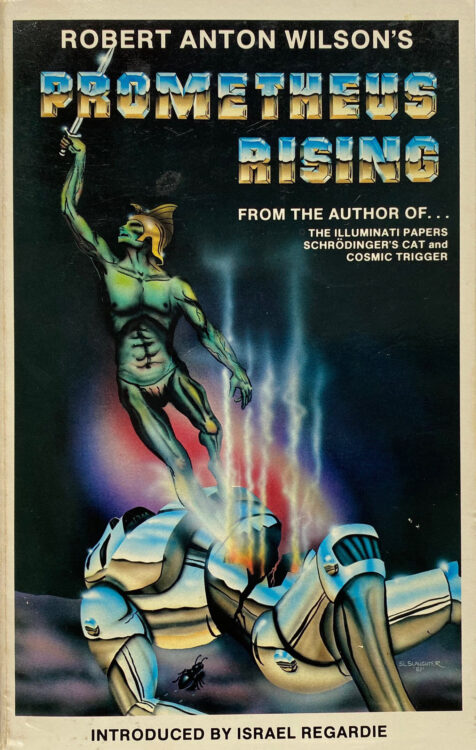 Robert Anton Wilson was probably the most successful popularizer of those ideas, even in many cases improving upon them, and quietly seeding them throughout the counterculture, in less flagrantly controversial packaging. The main idea, boiled down to its simplest form, which landed Leary in jail, and RAW fought so hard to keep alive, was that scientific research into the therapeutic potential of psychedelic drugs should be allowed to continue. An idea that over the course of the intervening decades has, slowly but surely, caught on, and spread. The successful legalization of supported use of psilocybin mushrooms in Oregon and Colorado, with more states to come, is exactly the kind of future Wilson and Leary were working towards.
Robert Anton Wilson was probably the most successful popularizer of those ideas, even in many cases improving upon them, and quietly seeding them throughout the counterculture, in less flagrantly controversial packaging. The main idea, boiled down to its simplest form, which landed Leary in jail, and RAW fought so hard to keep alive, was that scientific research into the therapeutic potential of psychedelic drugs should be allowed to continue. An idea that over the course of the intervening decades has, slowly but surely, caught on, and spread. The successful legalization of supported use of psilocybin mushrooms in Oregon and Colorado, with more states to come, is exactly the kind of future Wilson and Leary were working towards.
Towards the end of his life RAW also became an outspoken activist for medical marijuana, joining the WO/MAN Alliance for Medical Marijuana (WAMM), and directing his biting satire against the office of the US Drug Czar. I think even an incorrigible optimist like Mr. Wilson would be shocked at the shift that has occurred on this front in recent years.
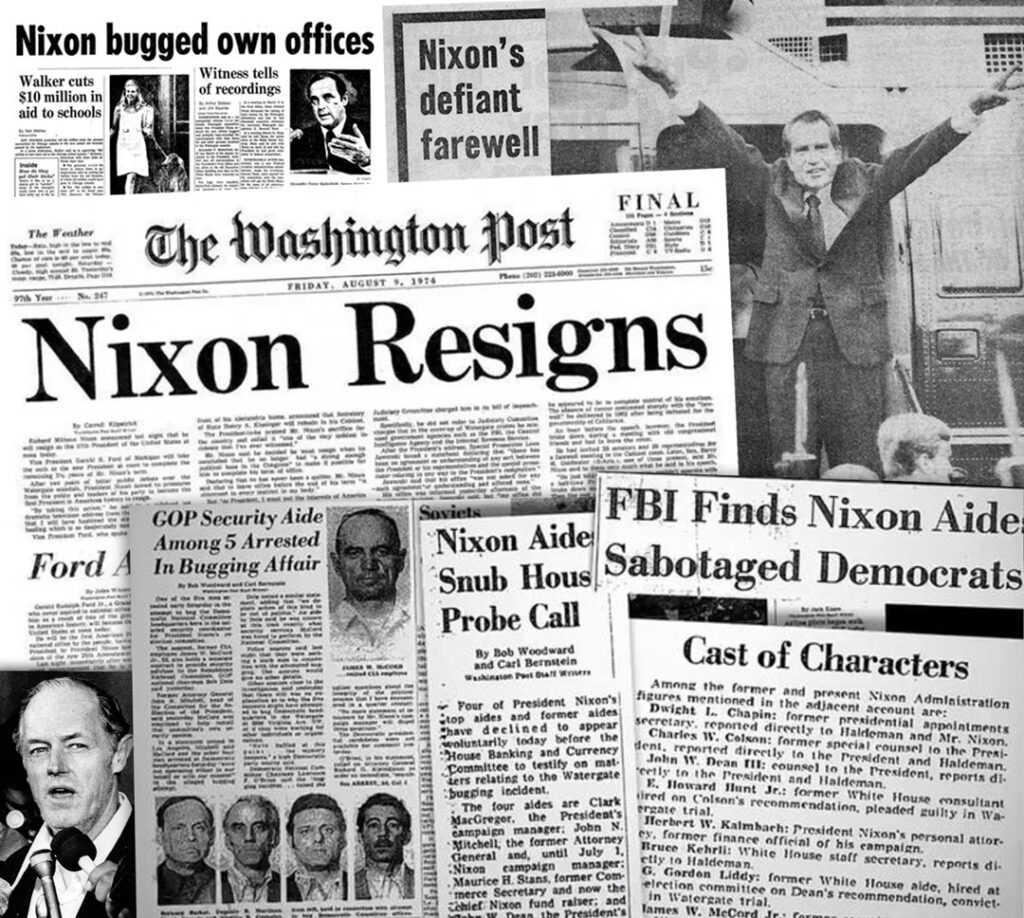 Although he did finally capture Timothy Leary, things didn’t necessarily work out so great for Richard Nixon, who would soon become ensnared in a scandal that would ultimately end his presidency. In 1973, as Watergate coverage dominated the news media, our old friend Kerry Thornley thought he recognized one of Nixon’s alleged conspirators, E. Howard Hunt. Thornley believed that he’d known Hunt back in New Orleans as a shady character going by the name Gary Kirstein, and what’s more, he suddenly remembered a conversation he’d had with him, in the Fall of 1962, about how to assassinate a President. The context of the conversation was that it was a purely theoretical exchange amongst aspiring writers, a creative exercise, in which Thornley recalls Kirstein proposing the usage of individuals who don’t even know they’re being used. Andrew ‘Moo Moo’ Sciambra, who worked on Jim Garrison’s investigation, once told Thornley that he was “the victim of the most fantastic chain of coincidences ever,” and over the years, the web of thermodynamic miracles that cascaded all around him had taken their toll.
Although he did finally capture Timothy Leary, things didn’t necessarily work out so great for Richard Nixon, who would soon become ensnared in a scandal that would ultimately end his presidency. In 1973, as Watergate coverage dominated the news media, our old friend Kerry Thornley thought he recognized one of Nixon’s alleged conspirators, E. Howard Hunt. Thornley believed that he’d known Hunt back in New Orleans as a shady character going by the name Gary Kirstein, and what’s more, he suddenly remembered a conversation he’d had with him, in the Fall of 1962, about how to assassinate a President. The context of the conversation was that it was a purely theoretical exchange amongst aspiring writers, a creative exercise, in which Thornley recalls Kirstein proposing the usage of individuals who don’t even know they’re being used. Andrew ‘Moo Moo’ Sciambra, who worked on Jim Garrison’s investigation, once told Thornley that he was “the victim of the most fantastic chain of coincidences ever,” and over the years, the web of thermodynamic miracles that cascaded all around him had taken their toll.
Thornley began to believe that he had indeed been unknowingly involved in the JFK assassination. He started sending Robert Anton Wilson increasingly desperate letters, detailing an elaborate plot against him, and escalating towards paranoid delusions of grandeur. Wilson tried to comfort his friend, gently reminding him of the difference between his imaginary theories and the provable facts. Unfortunately this only served to convince Thornley that RAW was also a part of the conspiracy. Thornley now suspected that the CIA had infiltrated the early Discordians, as a cover for the assassination bureau, and that RAW was his handler.
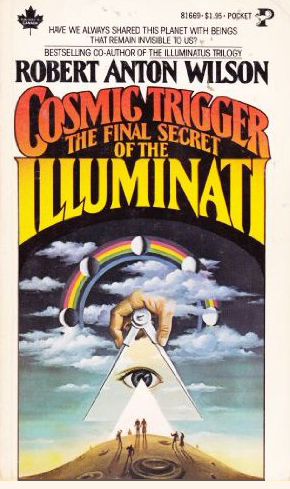 In his 1977 book Cosmic Trigger, Robert Anton Wilson details his experiences with a phenomenon he called Chapel Perilous, a psychological crossroads between paranoia and agnosticism. The idea being that when circumstances conspire, by hook or crook, to detach one from the ordinary experience of consensus reality, as with Thornley’s uncanny entanglement with the JFK conspiracy, the only escape is to relinquish the search for an absolute truth, and instead embrace the mystery of the unknown.
In his 1977 book Cosmic Trigger, Robert Anton Wilson details his experiences with a phenomenon he called Chapel Perilous, a psychological crossroads between paranoia and agnosticism. The idea being that when circumstances conspire, by hook or crook, to detach one from the ordinary experience of consensus reality, as with Thornley’s uncanny entanglement with the JFK conspiracy, the only escape is to relinquish the search for an absolute truth, and instead embrace the mystery of the unknown.
Discordian historian Adam Gorightly, the world’s leading expert on the Kerry Thornley story, as told in his book, The Prankster and the Conspiracy, can take you down the rest of that particular rabbit hole, if you’re so inclined. I got to a part that was so unbelievably rotten with coincidence that I took the time to independently verify the details, and can only throw my hands up in exasperation!
Wilson was sympathetic to Thornley’s plight, because he too had endured a significant break from reality, on July 23, 1973, RAW either achieved psychic contact with an extraterrestrial entity from the Sirius star system, or began hallucinating like mad! For about a year and a half Wilson endured a series of odd coincidences and incredible experiences, detailed in Cosmic Trigger, that reinforced the idea that he truly was in contact with a higher  intelligence. Around the same time, science fiction author Philip K. Dick was going through a very similar experience, as chronicled in his novel VALIS. RAW and PKD would meet to compare notes over their shared paranormal perturbations, each hoping the other might help them gauge their own sanity. Ultimately RAW was able to escape Chapel Perilous by deconstructing his alien contact experience through a variety of alternative interpretations, glorious in their multiplicity, including past lives, psychic transmissions, time travel, and even, for good measure, a 6 foot tall invisible rabbit named Harvey.
intelligence. Around the same time, science fiction author Philip K. Dick was going through a very similar experience, as chronicled in his novel VALIS. RAW and PKD would meet to compare notes over their shared paranormal perturbations, each hoping the other might help them gauge their own sanity. Ultimately RAW was able to escape Chapel Perilous by deconstructing his alien contact experience through a variety of alternative interpretations, glorious in their multiplicity, including past lives, psychic transmissions, time travel, and even, for good measure, a 6 foot tall invisible rabbit named Harvey.
RAW would eventually arrive at the conclusion that the experience was most likely psychological in nature, with a neurological basis, but remained open to the possibility of other explanations. In 1978, RAW was explaining this to an audience in Houston when 2 people got up and walked out of the lecture in apparent disgust. They were Marshall Applewhite & Bonnie Nettles, known then as Bo and Peep, the founders of the Heaven’s Gate cult. Presumably, RAW’s multi-model agnosticism didn’t jive with their true believer reality tunnel.
 An idea first proposed by Timothy Leary, but expanded upon by Wilson, a reality tunnel is the system of beliefs through which we construct our worldview. We don’t experience reality directly, but rather as interpreted by our senses, and filtered by our nervous system. To overly simplify, our cultural conditioning and personal development unconsciously shapes our experience of the world. The general idea of the reality tunnel has caught on in recent years, through similar concepts like confirmation bias, the Baader–Meinhof phenomenon, echo chambers/filter bubbles, and apophenia.
An idea first proposed by Timothy Leary, but expanded upon by Wilson, a reality tunnel is the system of beliefs through which we construct our worldview. We don’t experience reality directly, but rather as interpreted by our senses, and filtered by our nervous system. To overly simplify, our cultural conditioning and personal development unconsciously shapes our experience of the world. The general idea of the reality tunnel has caught on in recent years, through similar concepts like confirmation bias, the Baader–Meinhof phenomenon, echo chambers/filter bubbles, and apophenia.

The 23 Enigma, as propagated by Robert Anton Wilson, is a perfect example of the kinds of distortions that selective attention can create within our perceptions, unless, of course, it’s a genuine synchronistic phenomenon, and there really is some cosmic significance to the number twenty three! Wilson originally picked the idea up from his friend William S. Burroughs, who shared with him an experience he had with a series of eerie coincidences based around 23. Wilson took Burroughs’ story, added a bunch of his own anecdotes, and weaved it throughout Illuminatus! as a running gag. Eventually, as happens with most people exposed to the 23 Enigma, RAW couldn’t help but notice more and more instances of 23s popping up at the strangest of times, and it became a permanent fixture of his oeuvre. The most obvious explanation is that once people get it in their heads that 23s are special they start to look for them, and assign enhanced meaning to them when they are successfully found.
It’s similar to the Discordian Law of Fives, which states, “all phenomena are directly or indirectly related to the number five and this relationship can always be demonstrated, given enough ingenuity on the part of the demonstrator.” The number is arbitrary, the ingenuity is the key. Of course, we can relate 23 to 5 by simply noting that 2+3 = 5, but that’s besides the point!
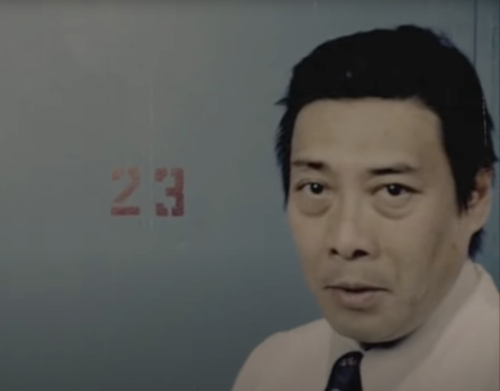 Though these days another factor has entered the calculus of the 23 Enigma, the intentional planting of 23s by those in the know. In the popular TV show LOST, when a shadowy Illuminati-esque organization called the DHARMA Initiative wanted to discipline someone they sent them to Room 23, where they would be subjected to psychedelic brainwashing. The number 23 in this case is no coincidence, it’s there because Damon Lindelof, the show’s co-creator, is a RAW fan. The slightly less than classic Jim Carrey movie, The Number 23, which features a man driven insane by his obsession with the titular number, was written by a RAW fan, Fernley Phillips. Not to be confused with 23, a German film based on the true story of hacker Karl Koch, a huge RAW fan, who was also obsessed with 23s. I won’t blame you if you do a double take the next time this numerical curiosity crosses your path, but do please remind yourself, it’s only a coincidence, it’s only a coincidence…
Though these days another factor has entered the calculus of the 23 Enigma, the intentional planting of 23s by those in the know. In the popular TV show LOST, when a shadowy Illuminati-esque organization called the DHARMA Initiative wanted to discipline someone they sent them to Room 23, where they would be subjected to psychedelic brainwashing. The number 23 in this case is no coincidence, it’s there because Damon Lindelof, the show’s co-creator, is a RAW fan. The slightly less than classic Jim Carrey movie, The Number 23, which features a man driven insane by his obsession with the titular number, was written by a RAW fan, Fernley Phillips. Not to be confused with 23, a German film based on the true story of hacker Karl Koch, a huge RAW fan, who was also obsessed with 23s. I won’t blame you if you do a double take the next time this numerical curiosity crosses your path, but do please remind yourself, it’s only a coincidence, it’s only a coincidence…
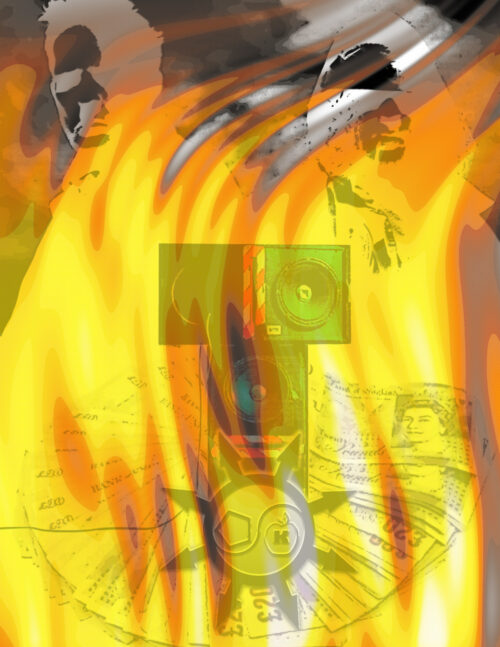 What happened on August 23, 1994 was no coincidence at all, but it is something of a mystery. In the wee hours, on a rainy night, on the Isle of Jura (where Orwell finished 1984 btw), Jimmy Cauty & Bill Drummond, famously of the British electronic band The KLF (AKA the Justified Ancients of Mu Mu, the JAMs, etc) burned £1,000,000 in cash! They also deleted their lucrative back catalog of chart topping hit records. Attempts to explain away their actions as a hoax or publicity stunt have been countered with independent investigative proof that they did indeed burn the money, and by all accounts, even they are unsure why. Cauty and Drummond filmed themselves feeding the prodigious heap of quid into a fireplace, and toured the film as a kind of performance art piece, asking the audience to help them understand their unthinkable decision.
What happened on August 23, 1994 was no coincidence at all, but it is something of a mystery. In the wee hours, on a rainy night, on the Isle of Jura (where Orwell finished 1984 btw), Jimmy Cauty & Bill Drummond, famously of the British electronic band The KLF (AKA the Justified Ancients of Mu Mu, the JAMs, etc) burned £1,000,000 in cash! They also deleted their lucrative back catalog of chart topping hit records. Attempts to explain away their actions as a hoax or publicity stunt have been countered with independent investigative proof that they did indeed burn the money, and by all accounts, even they are unsure why. Cauty and Drummond filmed themselves feeding the prodigious heap of quid into a fireplace, and toured the film as a kind of performance art piece, asking the audience to help them understand their unthinkable decision.
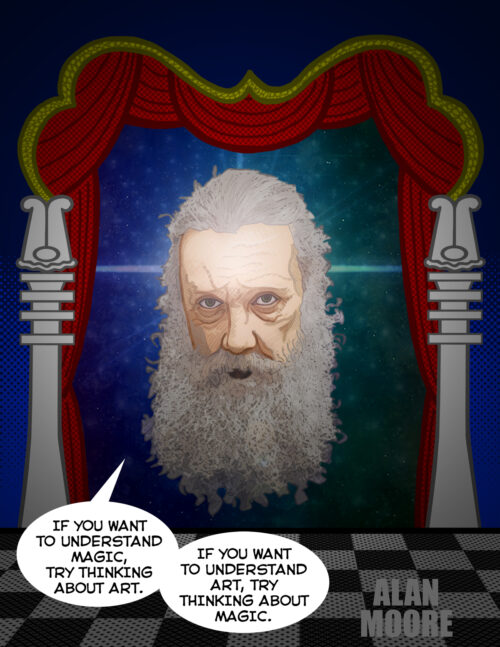 There was one man in particular whose expertise they sought out, and so on March 7, 1996, they brought the film out to Northampton, for a private showing in the living room of legendary writer Alan Moore. Now a few years earlier, on November 18, 1993, rather inebriated in a biker bar on his 40th birthday, Alan Moore announced to his assemblage of friends that he was going to become a magician. A declaration which he hadn’t really thought through, and wasn’t even really sure what it would entail, but nevertheless followed through on, producing some pretty dramatic results. So when Alan Moore pronounced the KLF’s money burning ritual “a powerful magical act,” he knew whereof he spoke. It would seem though, at the time, neither The KLF nor Alan Moore knew part of the reason the money was burned, and why Alan Moore was the perfect person to ask about it, was because of what happened in 1976.
There was one man in particular whose expertise they sought out, and so on March 7, 1996, they brought the film out to Northampton, for a private showing in the living room of legendary writer Alan Moore. Now a few years earlier, on November 18, 1993, rather inebriated in a biker bar on his 40th birthday, Alan Moore announced to his assemblage of friends that he was going to become a magician. A declaration which he hadn’t really thought through, and wasn’t even really sure what it would entail, but nevertheless followed through on, producing some pretty dramatic results. So when Alan Moore pronounced the KLF’s money burning ritual “a powerful magical act,” he knew whereof he spoke. It would seem though, at the time, neither The KLF nor Alan Moore knew part of the reason the money was burned, and why Alan Moore was the perfect person to ask about it, was because of what happened in 1976.
In 1976, Alan Moore’s friend and collaborator, Steve Moore (no relation), a fully initiated Discordian pope, gave him a copy of Illuminatus! For Moore, the kaleidoscopic countercultural tome proved very illuminating indeed. It gave Moore a new perspective on occult history and literature, encouraging him to take a personal interest, rather than just using it as window dressing for his fictions. Moore then marched towards his epic future, armed with a transformative bit of insight, one that he would wield to terrific effect throughout his supernatural career, as stated in Illuminatus!, “art is magic.”
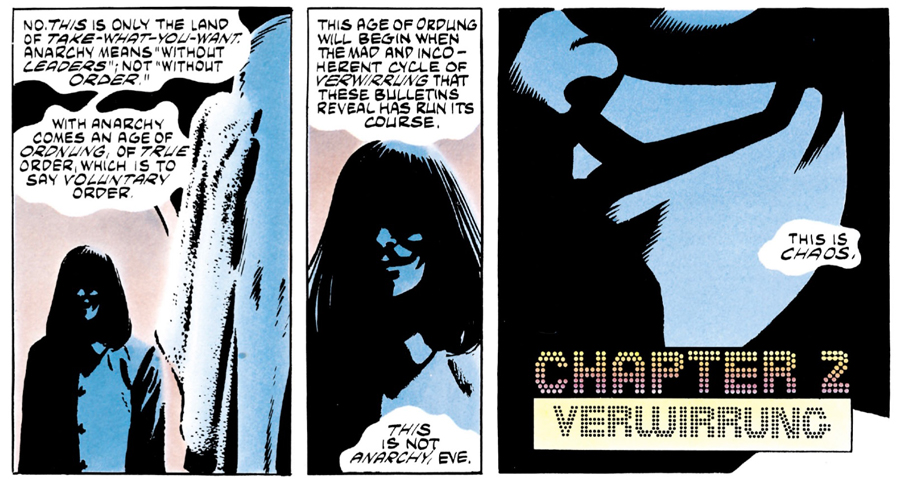
An Erisian excerpt from Alan Moore and David Lloyd’s V for Vendetta
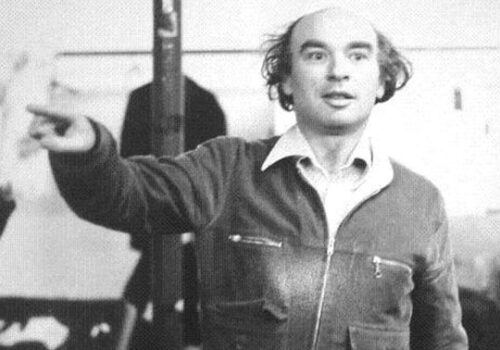 Around this same time, Ken Campbell, the one-man dynamo of British theater, would waltz into Compendium, a bookshop in Camden, London, and leave with Illuminatus! amongst a stack of sci-fi novels. The chaotic whimsy of Wilson & Shea’s worldview charmed Campbell, so much so that before the year was even over, he would create his massive theatrical adaptation.
Around this same time, Ken Campbell, the one-man dynamo of British theater, would waltz into Compendium, a bookshop in Camden, London, and leave with Illuminatus! amongst a stack of sci-fi novels. The chaotic whimsy of Wilson & Shea’s worldview charmed Campbell, so much so that before the year was even over, he would create his massive theatrical adaptation.
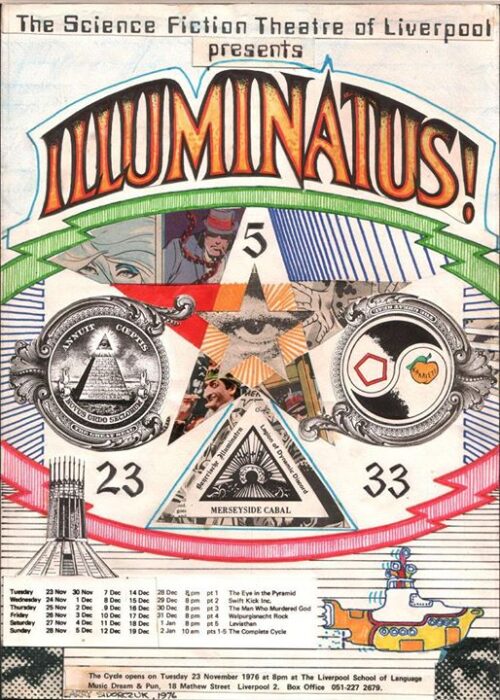 During the Summer of ‘76 pre-production for the play was in full swing, and a young set designer, 23 years old to be exact, was showing Campbell sketches for the stage sets, which he promptly ripped to shreds! “Heroic, Bill, it has to be heroic. There is nothing heroic about what you have done. In fact, it is rubbish.” The young set designer was, of course, Bill Drummond, soon to be of The KLF. Drummond would take Campbell’s words to heart, and even painted them on the studio wall, and did indeed build heroically innovative sets for the Illuminatus! play. On November 23, 1976, Illuminatus! opened in the back of Aunt Twackies, a café parlour in Liverpool, to ludicrously radiant reviews. The reception was so overwhelmingly positive that the 9 hour anarchistic, psychoactive, revolutionary production made the very unlikely transition to the National stage, where the show would be seen by a young Jimmy Cauty, the other half of The KLF.
During the Summer of ‘76 pre-production for the play was in full swing, and a young set designer, 23 years old to be exact, was showing Campbell sketches for the stage sets, which he promptly ripped to shreds! “Heroic, Bill, it has to be heroic. There is nothing heroic about what you have done. In fact, it is rubbish.” The young set designer was, of course, Bill Drummond, soon to be of The KLF. Drummond would take Campbell’s words to heart, and even painted them on the studio wall, and did indeed build heroically innovative sets for the Illuminatus! play. On November 23, 1976, Illuminatus! opened in the back of Aunt Twackies, a café parlour in Liverpool, to ludicrously radiant reviews. The reception was so overwhelmingly positive that the 9 hour anarchistic, psychoactive, revolutionary production made the very unlikely transition to the National stage, where the show would be seen by a young Jimmy Cauty, the other half of The KLF.

Bill Drummond and Jimmy Cauty
Bill Drummond didn’t think much of Illuminatus! when he first tried reading it, for reference, while designing the stage sets, but upon revisiting it in 1986, it sparked an epiphany. He didn’t even read that much of it, only the first 138 pages, but that was all it took for Erisian inspiration to strike. Bill Drummond and Jimmy Cauty would form The JAMs, aka The Justified Ancients of Mummu, a name, aesthetic, and guiding philosophy ripped from the pages of Illuminatus! A book Drummond had hardly read and Cauty had only seen the theatrical adaptation of, but which would inform the trajectory of their tumultuously successful careers. A stunningly surreal highlight of which would be the Stand by the JAMs music video, a Discordian spectacle featuring Tammy Wynette, which is basically big budget Illuminatus! fan fiction.
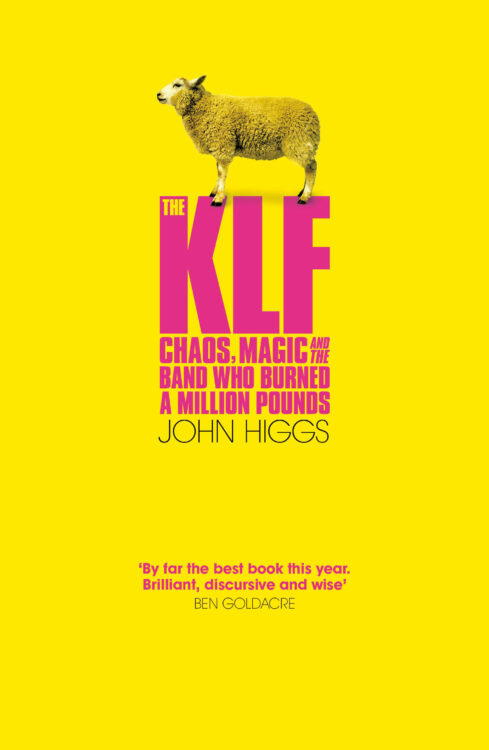 John Higgs, the great English writer, who would be the first to properly connect these discordant dots in his book The KLF: Chaos, magic and the band who burned a million pounds, once had the opportunity to ask Robert Anton Wilson himself what he thought of The KLF and their Illuminatus! inspired shenanigans, to which RAW replied, as any old man being asked about an experimental electronic band should, “I’ve never heard of them.” Wilson was quick to reply that Guns N’ Roses were also fans, recalling a fond memory of he and Leary on a lecture tour, getting wasted on a plane with GNR in 1991.
John Higgs, the great English writer, who would be the first to properly connect these discordant dots in his book The KLF: Chaos, magic and the band who burned a million pounds, once had the opportunity to ask Robert Anton Wilson himself what he thought of The KLF and their Illuminatus! inspired shenanigans, to which RAW replied, as any old man being asked about an experimental electronic band should, “I’ve never heard of them.” Wilson was quick to reply that Guns N’ Roses were also fans, recalling a fond memory of he and Leary on a lecture tour, getting wasted on a plane with GNR in 1991.
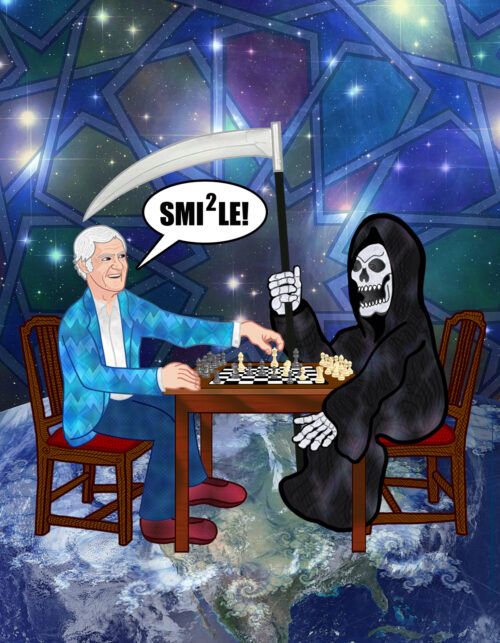 After Leary’s eventual release from prison in 1976, a hornet’s nest I won’t be poking here, except to note that he understandably chose to share his psychedelic worldview without necessarily focusing so much on the very illegal chemicals that had put him in such hot water. Leary, along with Wilson, began to explore techno-utopian transhumanism, which they promoted with the acronym S.M.I2.L.E., meaning, Space Migration, Intelligence Increase, and Life Extension. I must admit for my tastes, Leary and Wilson’s speculative, far flung, vision of humanity blossoming into cosmic immortality is much more appealing in theory than how the Silicon Valley billionaires are beginning to put it into practice, but as awkward as they may be, Leary and Wilson’s S.M.I2.L.E. vision is indeed taking its first steps, stumbling and bumbling, into reality.
After Leary’s eventual release from prison in 1976, a hornet’s nest I won’t be poking here, except to note that he understandably chose to share his psychedelic worldview without necessarily focusing so much on the very illegal chemicals that had put him in such hot water. Leary, along with Wilson, began to explore techno-utopian transhumanism, which they promoted with the acronym S.M.I2.L.E., meaning, Space Migration, Intelligence Increase, and Life Extension. I must admit for my tastes, Leary and Wilson’s speculative, far flung, vision of humanity blossoming into cosmic immortality is much more appealing in theory than how the Silicon Valley billionaires are beginning to put it into practice, but as awkward as they may be, Leary and Wilson’s S.M.I2.L.E. vision is indeed taking its first steps, stumbling and bumbling, into reality.
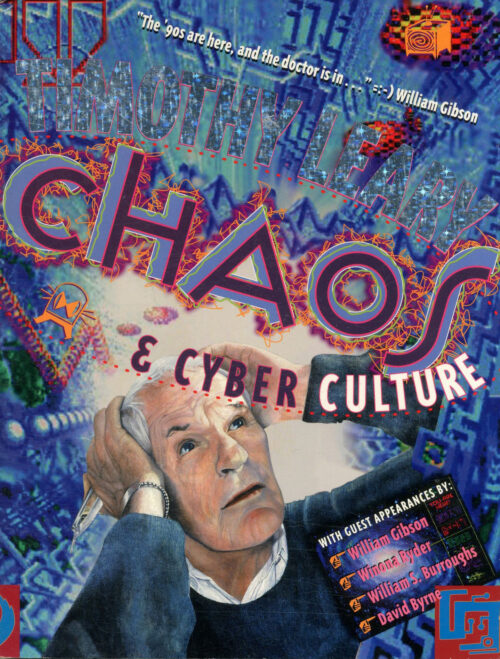 Leary and Wilson were also early proponents of the internet and virtual reality, imagining the emerging cyberculture as the fulfillment of the psychedelic revolution, which in many ways it probably was, even if the thrill of victory didn’t last long, and the unintended consequences remain formidable, there was a brief moment of creative elation, around the turn of the century, that maybe, against all odds, things could actually change for the better…
Leary and Wilson were also early proponents of the internet and virtual reality, imagining the emerging cyberculture as the fulfillment of the psychedelic revolution, which in many ways it probably was, even if the thrill of victory didn’t last long, and the unintended consequences remain formidable, there was a brief moment of creative elation, around the turn of the century, that maybe, against all odds, things could actually change for the better…
On February 19, 2000, Grant Morrison took the stage at the Hammerstein Ballroom, for their legendary Disinfo.Con speech, and after bellowing into the microphone, a literal clarion call, they said, “Fuck, man. I’ll tell you – when I was a kid I read Robert Anton Wilson and all this shit. And here we are, we’re standing here, and we’re talking about this shit, and it’s real.” A recurring theme in these RAW mythos is the tuned in friend who hands over a copy of Illuminatus! at just the right time. For Morrison, that friend was Bryan Talbot, and the time was 1981. A 21 year old Morrison would find himself transfixed by the all encompassing scale of Illuminatus! All their weird sub-cultural obsessions of the time were woven together into a holistic tapestry, “from the gutter to the 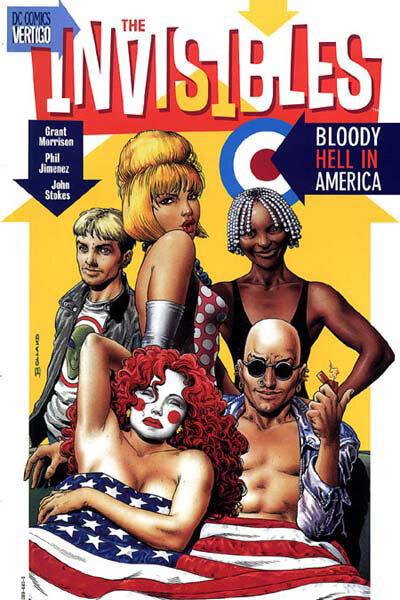 cosmos,” as they would later describe it. This would inspire Morrison to create their own grand scale, generational, hypersigil with The Invisibles. “Illuminatus! was obviously a direct influence on The Invisibles,” GM generously acknowledges, but really mostly just in approach, as Morrison would construct the substance of their story with a truly unique remixing of the ‘90s underground zeitgeist and their own magical adventures. Though to be fair, RAW had something of a hand in that zeitgeist and those magical adventures as well. The thing that Grant Morrison had declared as “real” in their Disinfo speech was Chaos Magic, a modern occult tradition that drew a fair bit of inspiration from Wilson and the Discordians.
cosmos,” as they would later describe it. This would inspire Morrison to create their own grand scale, generational, hypersigil with The Invisibles. “Illuminatus! was obviously a direct influence on The Invisibles,” GM generously acknowledges, but really mostly just in approach, as Morrison would construct the substance of their story with a truly unique remixing of the ‘90s underground zeitgeist and their own magical adventures. Though to be fair, RAW had something of a hand in that zeitgeist and those magical adventures as well. The thing that Grant Morrison had declared as “real” in their Disinfo speech was Chaos Magic, a modern occult tradition that drew a fair bit of inspiration from Wilson and the Discordians.
It’s a matter of contentious debate, but it appears pretty likely, to me, that the Wachowski’s borrowed a fair amount of material from The Invisibles for the original Matrix movie. In addition to the similar general premise, about a cell of ontological terrorists contending against a reality controlling conspiracy, Morrison was told, by those on set, that the art department of The Matrix had been given copies of The Invisibles graphic novels to use as reference. With this in mind, it’s hard not to see a telephone game of iterative inspiration, with strange occult ideas spreading through the underground towards the mainstream, bubbling up from Wilson and Shea’s Illuminatus!, to Morrison’s The Invisibles, to the Wachowski’s The Matrix, and now ubiquitously diffused throughout pop culture.
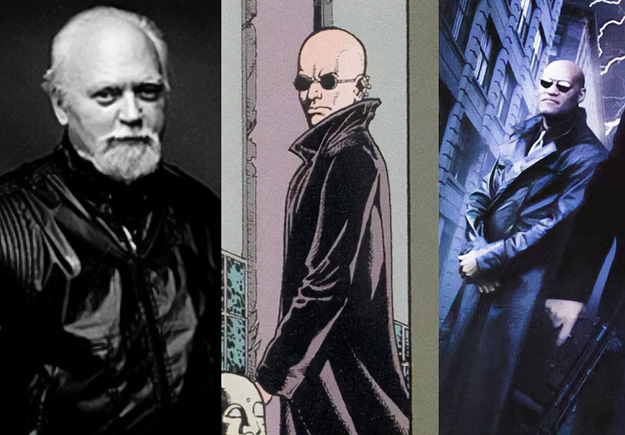
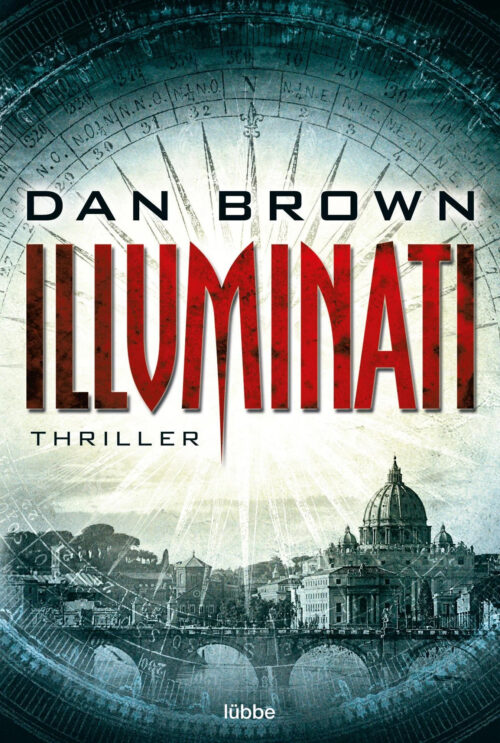 Here we must now confront the ambiguities of cultural influences, and the age old mystery of where artists get their ideas from. Not everyone is as forthcoming as Moore, Morrison, or Lindelof in terms of citing their references, and also, it’s not impossible for creators to independently arrive at the same idea. RAW once referred to himself as “the most ripped-off artist of our time,” in an interview with the Santa Cruz Metro. An interview which was inspired by the popularity of the 2004 film What the Bleep Do We Know!?, which explored the ideas of Quantum Physics in a strikingly similar manner as RAW had been doing for several decades. Though, in this case, RAW was referring to Dan Brown’s extraordinarily popular books Angels & Demons and The Da Vinci Code, which certainly seem to be playing in the same Illuminati sandbox, and definitely pulling from the same reference index as Illuminatus! and Wilson’s solo prequel series The Historical Illuminatus Chronicles. Brown has never acknowledged Wilson, so far as I can tell, and actually, since so much of Operation Mindfuck’s efforts to popularize the Illuminati were clandestine, he may not even know that RAW was behind the inspiration for his famous shadowy antagonists.
Here we must now confront the ambiguities of cultural influences, and the age old mystery of where artists get their ideas from. Not everyone is as forthcoming as Moore, Morrison, or Lindelof in terms of citing their references, and also, it’s not impossible for creators to independently arrive at the same idea. RAW once referred to himself as “the most ripped-off artist of our time,” in an interview with the Santa Cruz Metro. An interview which was inspired by the popularity of the 2004 film What the Bleep Do We Know!?, which explored the ideas of Quantum Physics in a strikingly similar manner as RAW had been doing for several decades. Though, in this case, RAW was referring to Dan Brown’s extraordinarily popular books Angels & Demons and The Da Vinci Code, which certainly seem to be playing in the same Illuminati sandbox, and definitely pulling from the same reference index as Illuminatus! and Wilson’s solo prequel series The Historical Illuminatus Chronicles. Brown has never acknowledged Wilson, so far as I can tell, and actually, since so much of Operation Mindfuck’s efforts to popularize the Illuminati were clandestine, he may not even know that RAW was behind the inspiration for his famous shadowy antagonists.
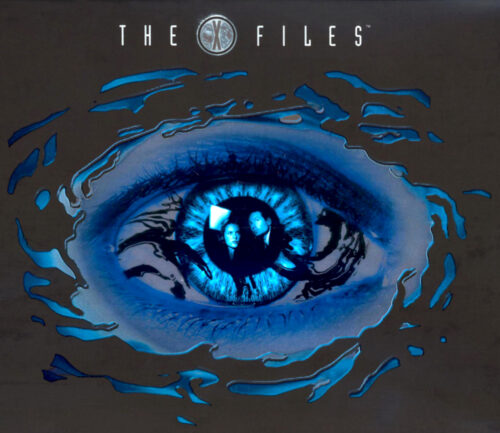 The same goes for the hugely popular TV and movie series The X-Files. Any mainstream press that RAW gets will typically claim that he was an inspiration for the series, but so far as I can tell, X-Files creator, Chris Carter doesn’t credit RAW anywhere. It’s a tempting connection to make though, as Illuminatus! and The X-Files share the exact same general premise of two investigators following the trail of exaggerated versions of real life conspiracy theories, and pretty much any examination of the show’s lore will inevitably mention RAW, but the truth, as ever, remains shrouded in mystery.
The same goes for the hugely popular TV and movie series The X-Files. Any mainstream press that RAW gets will typically claim that he was an inspiration for the series, but so far as I can tell, X-Files creator, Chris Carter doesn’t credit RAW anywhere. It’s a tempting connection to make though, as Illuminatus! and The X-Files share the exact same general premise of two investigators following the trail of exaggerated versions of real life conspiracy theories, and pretty much any examination of the show’s lore will inevitably mention RAW, but the truth, as ever, remains shrouded in mystery.
Just as an aside, a young writer, who cut his teeth writing on The X-Files, Vince Gilligan, would go on to create the iconic character Saul Goodman, for his own shows Breaking Bad and Better Call Saul. And, of course, one of the main characters of Illuminatus!, in fact, one of the 2 investigators mentioned above, is named Saul Goodman. Funnily enough, when it comes to RAW, it’s actually more thematically relevant if it’s just a coincidence, than if it were an intentional reference.
To quote RAW, paraphrasing the Buddha, “in a burning house it profits not to ask who started the fire.”
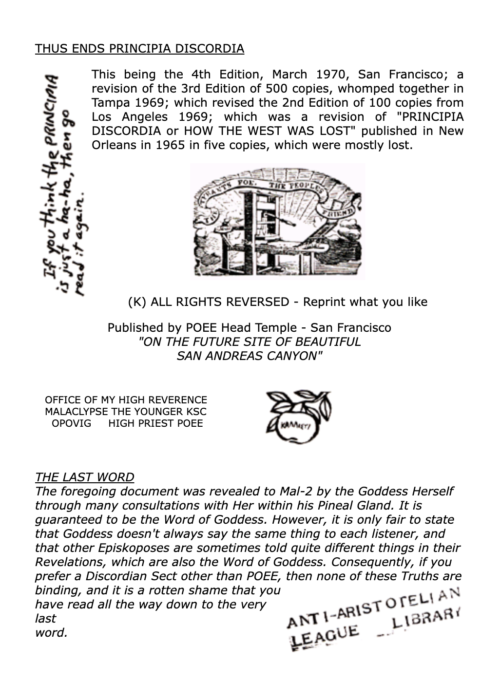 There’s actually a somewhat reasonable explanation for why creators may have felt so comfortable running with RAW’s ideas without attribution, and it leads all the way back to that founding document of the Discordian Society, the Principia Discordia, originally loosed upon the world from Jim Garrison’s copy machine. The 4th edition of the Principia Discordia, published in 1970, came with an interesting bit of legalese: “(K) ALL RIGHTS REVERSED – Reprint what you like” The idea of kopyleft, as opposed to copyright, spread through the counterculture of the ‘70’s and influenced the newly developing hacker scene, feeding directly into the open source model of software development. While Illuminatus! itself wasn’t kopyleft, it being so intertwined with the anarchistic, DIY aesthetic of Discordianism probably created some confusion about how fast and loose these ideas should be spread.
There’s actually a somewhat reasonable explanation for why creators may have felt so comfortable running with RAW’s ideas without attribution, and it leads all the way back to that founding document of the Discordian Society, the Principia Discordia, originally loosed upon the world from Jim Garrison’s copy machine. The 4th edition of the Principia Discordia, published in 1970, came with an interesting bit of legalese: “(K) ALL RIGHTS REVERSED – Reprint what you like” The idea of kopyleft, as opposed to copyright, spread through the counterculture of the ‘70’s and influenced the newly developing hacker scene, feeding directly into the open source model of software development. While Illuminatus! itself wasn’t kopyleft, it being so intertwined with the anarchistic, DIY aesthetic of Discordianism probably created some confusion about how fast and loose these ideas should be spread.
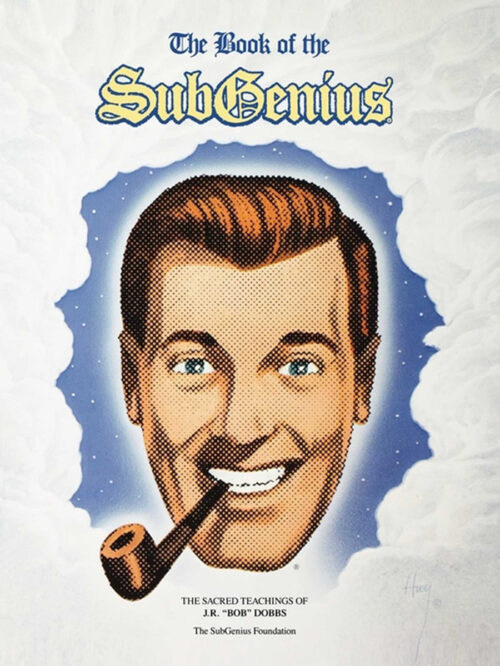 The Church of the SubGenius, another parody religion/cult, founded by the pseudonymous duo of Ivan Stang and Philo Drummond in 1981, pulled freely from Discordianism and Robert Anton Wilson. In this case, the kopyleft distinction was functioning as intended, allowing for durable mutations of the original meme, which continued on in the spirit of the original. Ivan Stang has broken kayfabe just enough to all but confirm that there is indeed a direct connection between the SubGenius figurehead, J. R. “Bob” Dobbs and Bob Wilson. The visage of the pipe smoking, prophetic, patriarch is very likely, at least vaguely, familiar to readers of a certain age. RAW seemed to enjoy playing with SubGenius ideas as much as they liked his, an ideal open cultural exchange.
The Church of the SubGenius, another parody religion/cult, founded by the pseudonymous duo of Ivan Stang and Philo Drummond in 1981, pulled freely from Discordianism and Robert Anton Wilson. In this case, the kopyleft distinction was functioning as intended, allowing for durable mutations of the original meme, which continued on in the spirit of the original. Ivan Stang has broken kayfabe just enough to all but confirm that there is indeed a direct connection between the SubGenius figurehead, J. R. “Bob” Dobbs and Bob Wilson. The visage of the pipe smoking, prophetic, patriarch is very likely, at least vaguely, familiar to readers of a certain age. RAW seemed to enjoy playing with SubGenius ideas as much as they liked his, an ideal open cultural exchange.
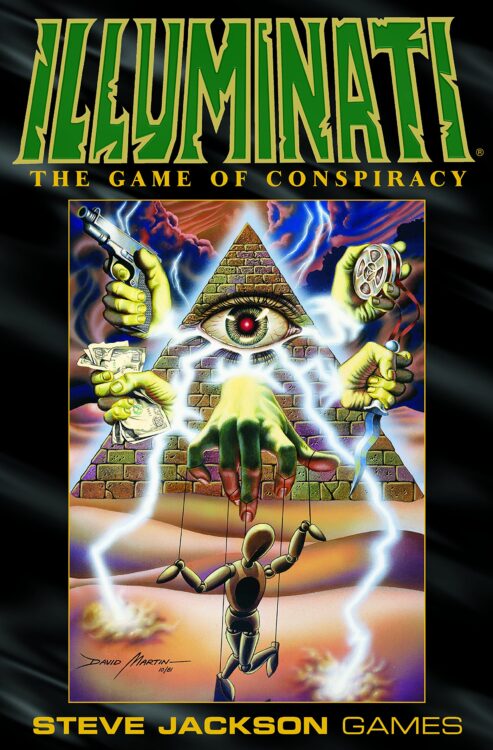 The Steve Jackson Illuminati card game, on the other hand, seemed to annoy RAW as soullessly cashing in on his and Bob Shea’s ideas. It’s no secret that Jackson used the Illuminatus! Trilogy as inspiration for his game, but simply changed it just enough to avoid paying a license fee. The game has remained in print since it was released in 1981, receiving regular expansion packs through the decades, and a recent video game adaptation. In fact, credit and/or blame where it’s due, that game probably has a fair amount to do with the ubiquity of the Illuminati meme.
The Steve Jackson Illuminati card game, on the other hand, seemed to annoy RAW as soullessly cashing in on his and Bob Shea’s ideas. It’s no secret that Jackson used the Illuminatus! Trilogy as inspiration for his game, but simply changed it just enough to avoid paying a license fee. The game has remained in print since it was released in 1981, receiving regular expansion packs through the decades, and a recent video game adaptation. In fact, credit and/or blame where it’s due, that game probably has a fair amount to do with the ubiquity of the Illuminati meme.
On March 18, 2007, at Queen Elizabeth Hall, on the South Bank in London, England, Ken Campbell, Bill Drummond, and Alan Moore took to the stage to honor the recently deceased Robert Anton Wilson. In Alan Moore’s wonderful eulogy, he was perhaps the first to make note of the turning tide of Operation Mindfuck, and how RAW’s alchemical efforts to transform paranoia into an illuminating game were being undone by people like Dan Brown and David Icke. It became an increasingly common lament, that the niche/liminal space once occupied by RAW was now being filled by less scrupulous folks like Alex Jones, Joe Rogan, Jordan Peterson, etc. As paranoia about the Illuminati grew and twisted into things like the QAnon conspiracy theory, it was hard to deny the possibility that Operation Mindfuck was too successful, as RAW’s cyberpunk pioneering friends, R.U. Sirius and Douglas Rushkoff put it. Documentary filmmaker Adam Curtis, in his 2021 television series Can’t Get You Out of My Head, connected the development of Operation Mindfuck to the emergence of a new form of authoritarian propaganda. This new variety of disinformation, as practiced by the likes of Putin’s advisor Vladislav Surkov, or Trump’s strategist Steve Bannon, doesn’t want to convince anyone of anything in particular, but rather to destabilize perceptions to the point that no one can tell what’s real or what’s fake, and not as an illuminating game, as RAW practiced it, but to paralyze opposition with confusion and uncertainty. The ultimate irony being that Operation Mindfuck began with disdain for conspiracy theories, and concern that they could be weaponized as a means of authoritarian control.
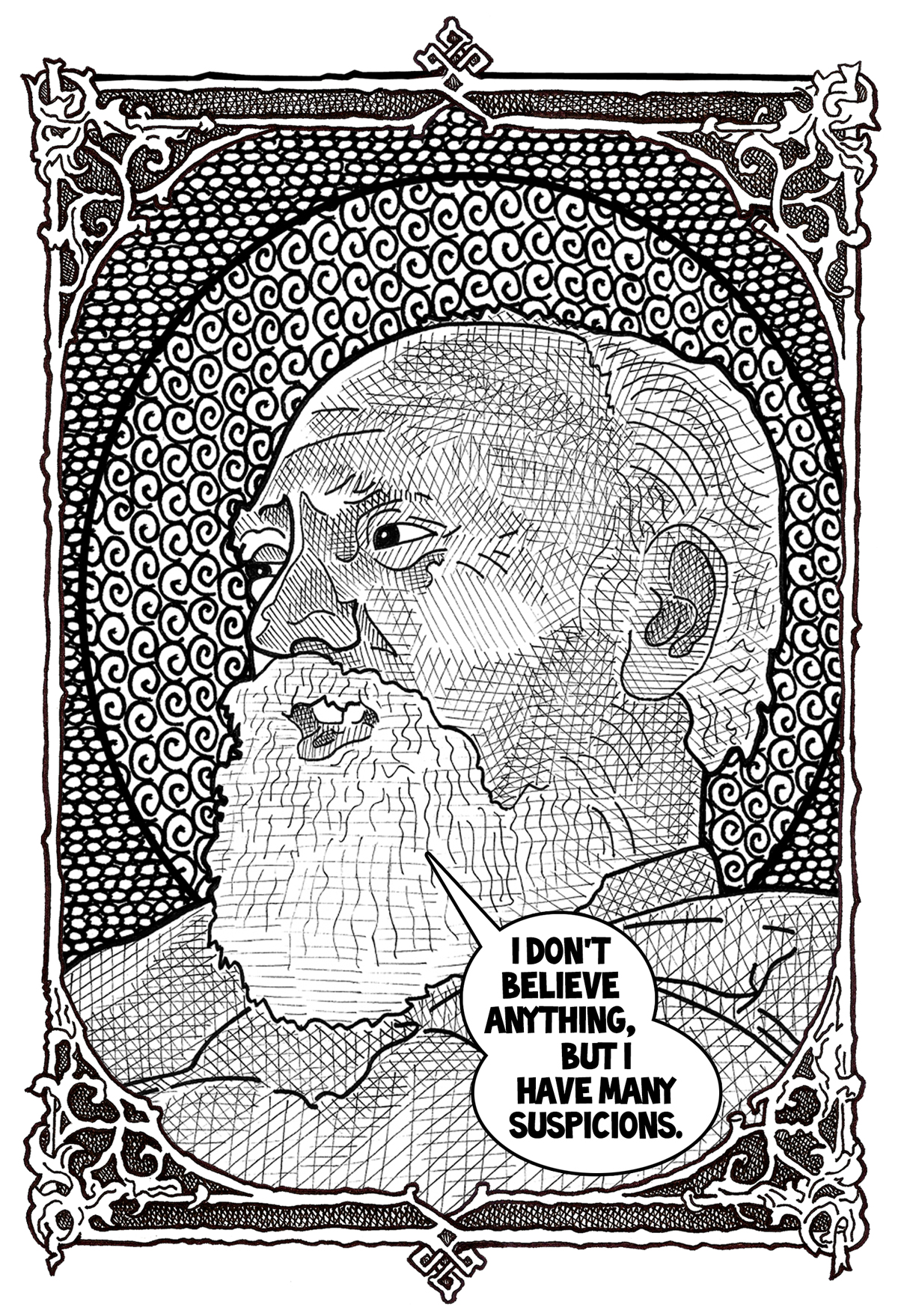 RAW had a uniquely well informed take on the proliferation of conspiracy theories, which may be well worth considering, given the circumstances. Wilson proposed that conspiracy theories provide a refuge from the terror of the unknown. That when things are changing faster than people can comprehend, they tend towards sinister explanations, because at least those are explanations they can understand. It’s actually more comforting to believe, for example, that a cabal of ancient lizard people control the world, because, for many, it sure beats the disconcerting truth that no one is in control. The world isn’t chaotic because some fascist propagandist made it so, not that they and their kind wouldn’t love to leverage the quantum fog of confusion to piss on your boots and tell you it’s raining, because they would, and will certainly try, but we can’t escape this “post-truth” Chapel Perilous of converging crisis and absolute uncertainty by retreating back to some imagined past, where a kindly expert, like Walter Cronkite, could simply tell us all how the world really is. I think we’re probably going to have to confront the chaos head on.
RAW had a uniquely well informed take on the proliferation of conspiracy theories, which may be well worth considering, given the circumstances. Wilson proposed that conspiracy theories provide a refuge from the terror of the unknown. That when things are changing faster than people can comprehend, they tend towards sinister explanations, because at least those are explanations they can understand. It’s actually more comforting to believe, for example, that a cabal of ancient lizard people control the world, because, for many, it sure beats the disconcerting truth that no one is in control. The world isn’t chaotic because some fascist propagandist made it so, not that they and their kind wouldn’t love to leverage the quantum fog of confusion to piss on your boots and tell you it’s raining, because they would, and will certainly try, but we can’t escape this “post-truth” Chapel Perilous of converging crisis and absolute uncertainty by retreating back to some imagined past, where a kindly expert, like Walter Cronkite, could simply tell us all how the world really is. I think we’re probably going to have to confront the chaos head on.
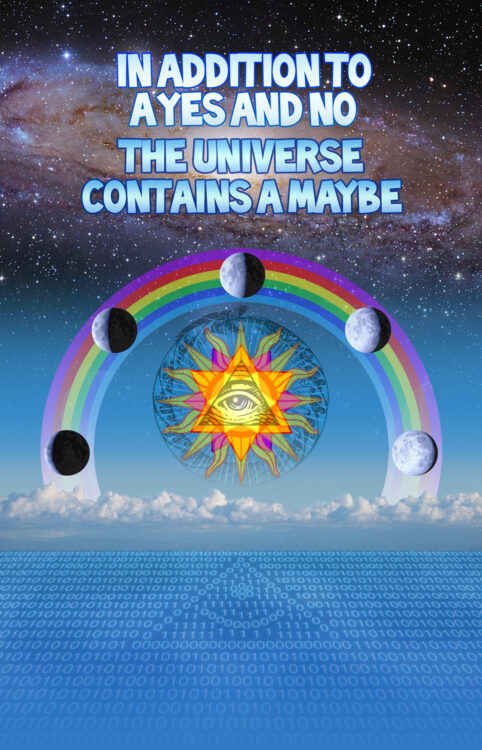 RAW proposed Maybe Logic, a slightly more user-friendly branding for his multi-model agnosticism, as a method of navigating a world without certainty. The main problem people have when dealing with the contradictions of modernity, Wilson suggests, is our habit of Aristotelian either/or thinking. We want things to be either true or false, right or wrong, and have trouble processing conflicting information, because it disrupts the comfort of binary discernment. RAW’s Maybe Logic encourages us to consider degrees of probability beyond just true and false. Not in a way where we give in to nihilism and proclaim all things unknowable, but just a more flexible mindset that can better deal with the ambiguity of this hopelessly chaotic world.
RAW proposed Maybe Logic, a slightly more user-friendly branding for his multi-model agnosticism, as a method of navigating a world without certainty. The main problem people have when dealing with the contradictions of modernity, Wilson suggests, is our habit of Aristotelian either/or thinking. We want things to be either true or false, right or wrong, and have trouble processing conflicting information, because it disrupts the comfort of binary discernment. RAW’s Maybe Logic encourages us to consider degrees of probability beyond just true and false. Not in a way where we give in to nihilism and proclaim all things unknowable, but just a more flexible mindset that can better deal with the ambiguity of this hopelessly chaotic world.
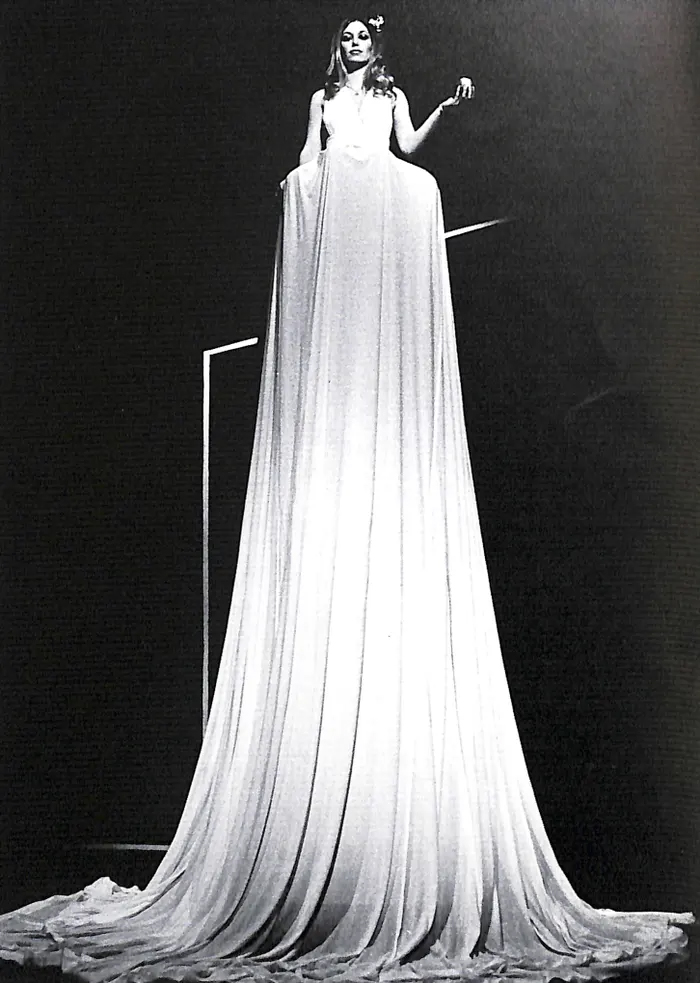 Back in 1976, Prunella Gee was starring in the Illuminatus! play as the goddess of chaos herself, our Lady of Discordia, Eris. Throughout the production of the play, she and director Ken Campbell would fall in love, and as legend has it, conceive a child backstage, Daisy Eris Campbell. Daisy would grow up to brilliantly follow in her father’s impossible footsteps, and with encouragement from Alan Moore, who passed along the key insight of the art/magic continuum, in 2014, would produce a spiritual sequel to the Illuminatus! Play, by adapting Wilson’s autobiographical Cosmic Trigger for the stage.
Back in 1976, Prunella Gee was starring in the Illuminatus! play as the goddess of chaos herself, our Lady of Discordia, Eris. Throughout the production of the play, she and director Ken Campbell would fall in love, and as legend has it, conceive a child backstage, Daisy Eris Campbell. Daisy would grow up to brilliantly follow in her father’s impossible footsteps, and with encouragement from Alan Moore, who passed along the key insight of the art/magic continuum, in 2014, would produce a spiritual sequel to the Illuminatus! Play, by adapting Wilson’s autobiographical Cosmic Trigger for the stage.
 It was yet another rousing creative success, with glowing reviews, and a resonating sub-cultural impact that galvanized the British underground art scene, and inspired more Discordian activity than I could ever hope to cover here. (Shouts out to the Liverpool Arts Lab though!) The play’s 2017 revival coincidentally coincided with the 23rd anniversary of The KLF’s money burning ritual, which they celebrated with a reunion and the release of an Illuminatus! inspired novel: 2023: A Trilogy.
It was yet another rousing creative success, with glowing reviews, and a resonating sub-cultural impact that galvanized the British underground art scene, and inspired more Discordian activity than I could ever hope to cover here. (Shouts out to the Liverpool Arts Lab though!) The play’s 2017 revival coincidentally coincided with the 23rd anniversary of The KLF’s money burning ritual, which they celebrated with a reunion and the release of an Illuminatus! inspired novel: 2023: A Trilogy.
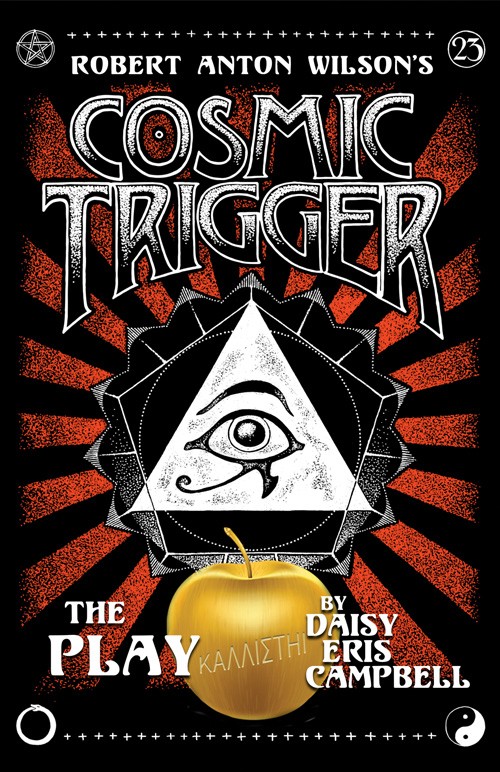 This week I read through the script of Daisy’s Cosmic Trigger play (published by Hilaritas Press, 2021), hoping that she might have included the bit about RAW making a cameo in her dad’s play, so I could put a nice, neat, little ribbon on our journey here, and it turns out, not only did she include it, but it’s the climax of the play. And beyond just that, it’s a monumentally poignant, cosmically heartbreaking, and transcendentally heroic moment, that I won’t spoil here, because really, you should experience it for yourself. Suffice to say, I feel emboldened to end this story right back where we started, in 1977, with Robert Anton Wilson standing on that stage, chanting, “do what thou wilt shall be the whole of the law,” the center of an invisible mandala of creative causality, whose intricate patterns radiate out in every direction, triggering an endless array of illuminating effects, all around this wonderfully weird RAW world :)))
This week I read through the script of Daisy’s Cosmic Trigger play (published by Hilaritas Press, 2021), hoping that she might have included the bit about RAW making a cameo in her dad’s play, so I could put a nice, neat, little ribbon on our journey here, and it turns out, not only did she include it, but it’s the climax of the play. And beyond just that, it’s a monumentally poignant, cosmically heartbreaking, and transcendentally heroic moment, that I won’t spoil here, because really, you should experience it for yourself. Suffice to say, I feel emboldened to end this story right back where we started, in 1977, with Robert Anton Wilson standing on that stage, chanting, “do what thou wilt shall be the whole of the law,” the center of an invisible mandala of creative causality, whose intricate patterns radiate out in every direction, triggering an endless array of illuminating effects, all around this wonderfully weird RAW world :)))

WITH SUPER VERY MANY THANKS TO JOHN HIGGS, DAISY ERIS CAMPBELL, ADAM GORIGHTLY, AND ADAM CURTIS FOR REFERENCE MATERIALS AND RICHARD RASA, ERIC WAGNER, MIKE GATHERS, TOM JACKSON, OZ FRITZ, MICHAEL JOHNSON, STEVE FLY, AND GREGORY ARNOTT FOR EDITORIAL ASSISTANCE <3<3<3
ERIS’ NEW DRESS
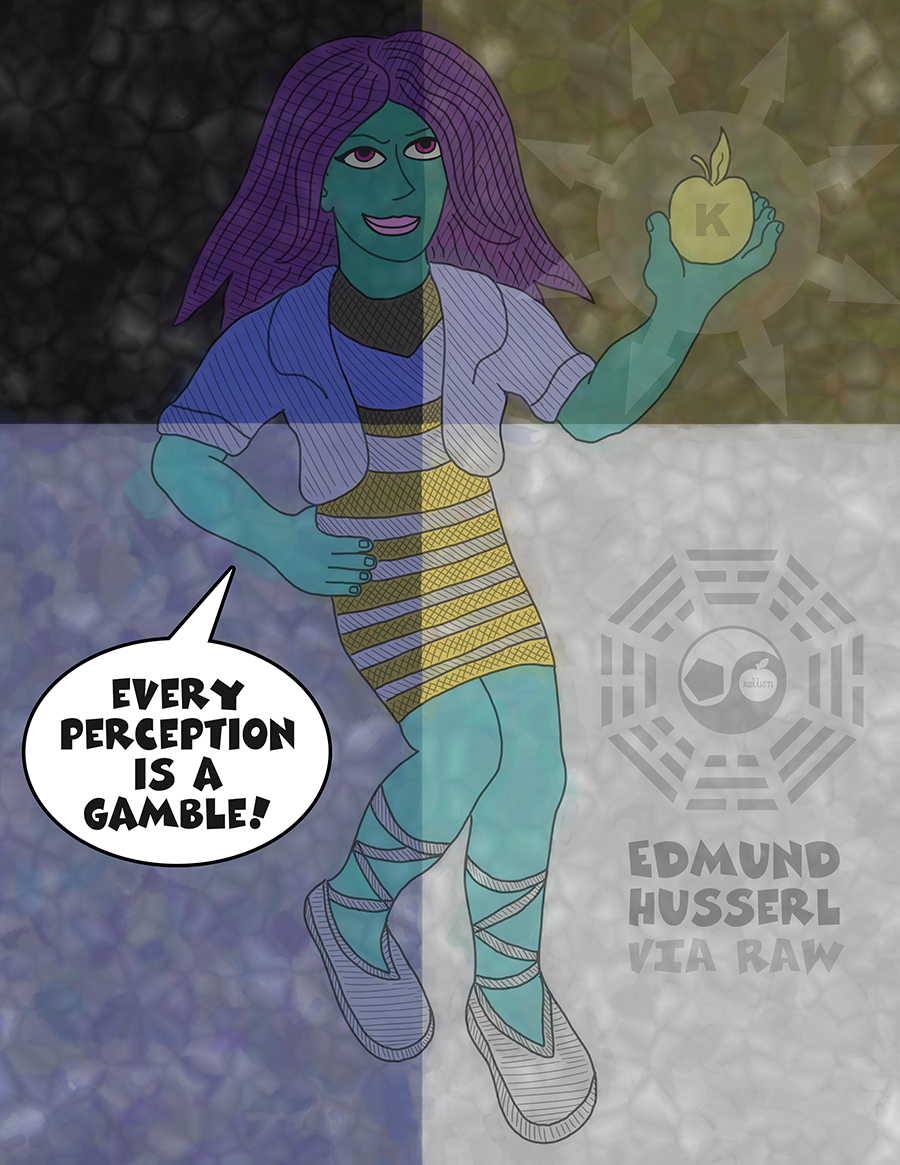
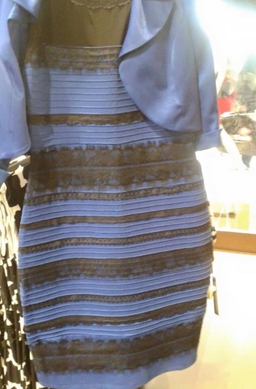 A wonderfully Discordian media virus recently ran its course through the simultaneous resonance of our social networks, a meme so efficient and contentious that it became ubiquitous almost immediately, and can be invoked simply by saying “The Dress.”
A wonderfully Discordian media virus recently ran its course through the simultaneous resonance of our social networks, a meme so efficient and contentious that it became ubiquitous almost immediately, and can be invoked simply by saying “The Dress.”
Like the mythic Apple of Discord, thrown by Eris’ to instigate a fight amongst the gods, the ambiguously hued picture sparked immediate conflict amongst its viewers, who vigorously argued about its contents.
A media virus, as defined by Douglas Rushkoff, consists of a protective & sticky outer shell, and a hidden payload of memetic code. (A Trogan Horse for ideas.) The outer shell is the surface issue/face value of a meme, in this case, the question: “What color is this dress?”
The adhesive shell becomes attached to a host medium and thence its memetic programming gets injected therein. This meme was particularly sticky because people could not understand how anyone could possibly disagree with, what was presumed to be, their objective observation.
The memetic programming contained within the argument of “Black & Blue vs. White & Gold,” amongst all the science of perception, seems to be something akin to the zen koan: “Who is the great magician that makes the grass green?”
Without really realizing it, the internet just got a crash course in Maybe Logic :)))
Digital Prophets
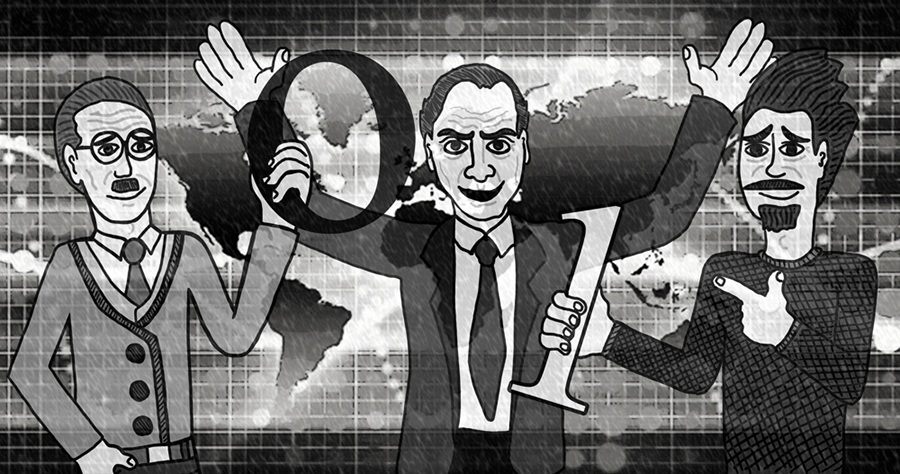
“These people, Joyce, to some degree Pound, McLuhan, they were the prophets of the world in which we now stand, the world of integrated interactive media, extraordinary data retrieval that erases the 17th century notion of the unconscious. Nothing is now unconscious if your data search commands are powerful enough.”
– Terence McKenna in Riding Range w/ Marshall McLuhan
